The Slow Flowers Podcast is the award-winning show known as the “Voice of the Slow Flowers Movement.” Launched in 2013 as the original flower podcast, we’ve devoted more than 10 years to covering the business of flower farming, floral design, and the Slow Flowers sustainability ethos. Listen to a new episode each Wednesday, available for free download here at slowflowerspodcast.com or on iTunes, Spotify, and other podcast platforms.
October 24th, 2018
Podcast: Play in new window | Download
Subscribe: Apple Podcasts | Podcast Index | | More
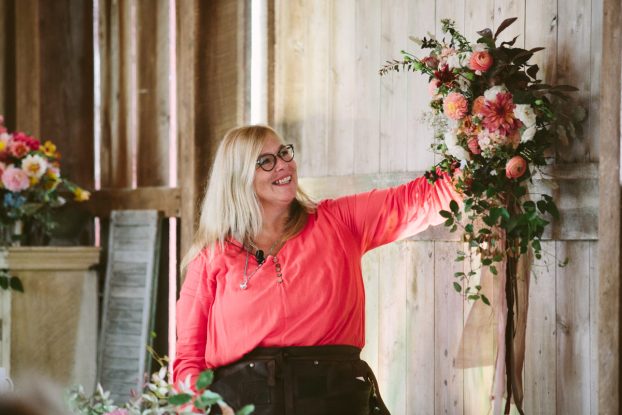
Holly Heider Chapple at Flowerstock 2018 (c) Sarah Collier
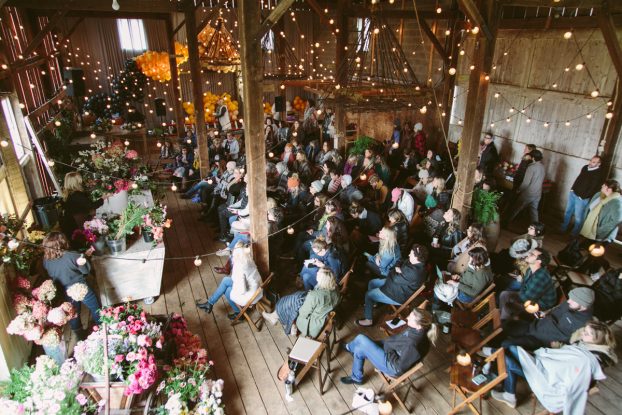
Love this photo, captured by Sarah Collier, of the Flowerstock experience, photographed during one of Holly’s presentations.
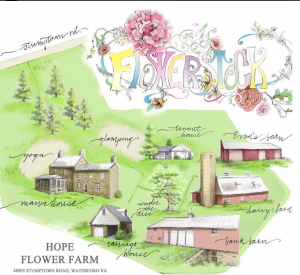 Last week, Holly Heider Chapple welcomed designers and flower lovers from near and far to Flowerstock at HOPE Flower Farm.
Last week, Holly Heider Chapple welcomed designers and flower lovers from near and far to Flowerstock at HOPE Flower Farm.
Floral professionals and members of the floral community gathered for two days of demonstrations and talks by renowned floral designers, including Holly, Steve Moore of Sinclair & Moore, Nancy Teasley of Oak & the Owl and Alicia and Adam Rico of Bows & Arrows.
It was an honor to join Holly at Flowerstock for the second time as a a teacher.
I led a number of creative writing exercises for attendees, guiding floral creatives through various modules of describing flowers, color and memories in a new way.
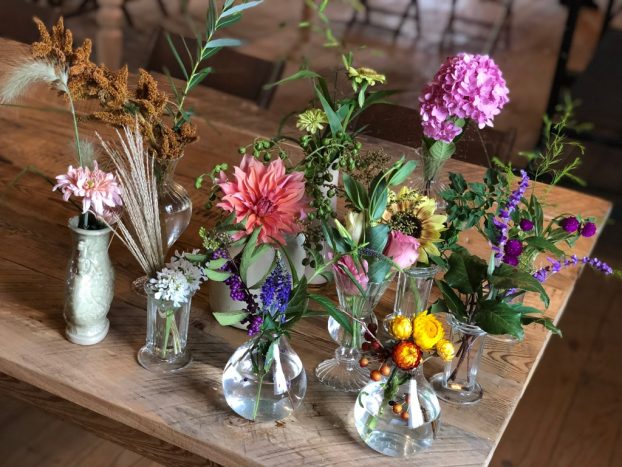
These bud vases, arranged and photographed by Andrea K. Grist, were part of a writing module to describe what we see.
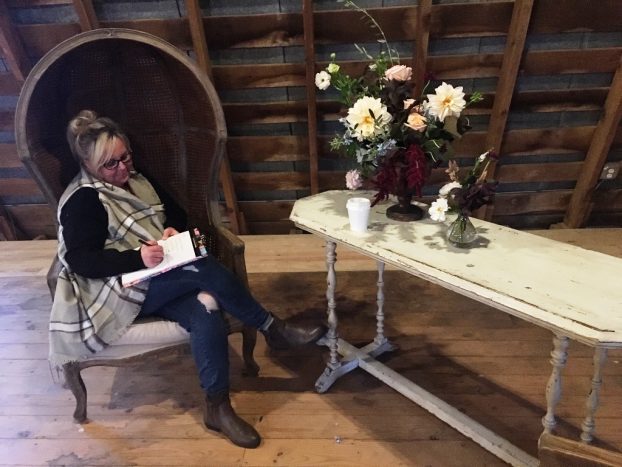
There were many quiet corners for writing, upstairs in the Dairy Barn, which is where I found Kelly Shore with pen, paper and flowers!
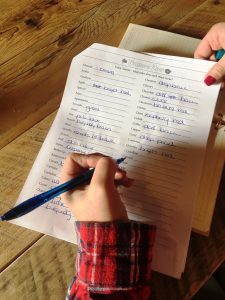
Color word-play is an important part of the Creative Writing Process, too, richly expanding our language.
The personal floral narrative is powerful.
We heard this idea many times from my fellow presenters and the timing was perfect for those who brought pens, paper, their open minds and a little vulnerability to the process.
We gathered upstairs in one of the barns, where there was a creative space for writing, photography and floral design. Thank you to all who participated.
I’m eager to read more of your writing!
Before I departed Flowerstock to return to Seattle, I asked Holly if we could sit down for the Slow Flowers Podcast to record an update from her and she agreed.
It was nice to sneak away to the Tenant House, where many of the speakers stayed, and sit in a comfy corner to speak uninterrupted.
We didn’t watch the clock, so this is a longish episode. We’ll forgive you if you listen in smaller units of time.
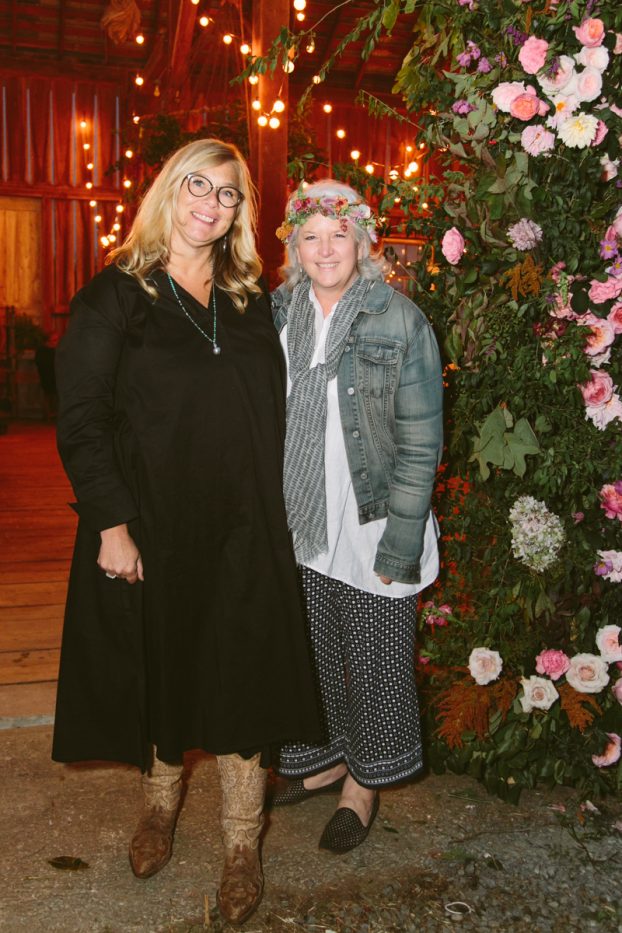
Sarah Collier captured this party photo of Holly and me, just prior to the final evening’s dinner. What a fun memento!
The first half of this episode focuses on Flowerstock and you can feel our emotions and joy while listening to Holly and I share highlights with one another.
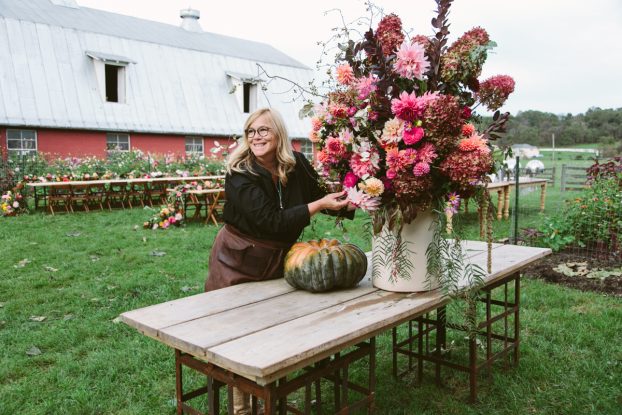
This is the massive arrangement that Holly created at Flowerstock using the new extra-large Holly Pillow, a foam-free mechanic that she designed in conjunction with Syndicate Sales. (c) Sarah Collier
Then, during the second half of this episode, I ask Holly to update me on all that’s has happened in the past year with her new product line created in partnership with Syndicate Sales.
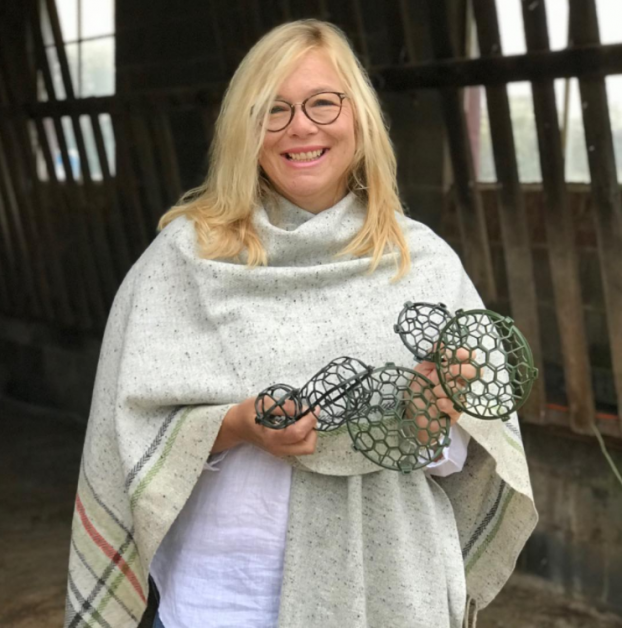
Holly Chapple holding her new grid-format “eggs” and “pillow cages,” designed with Syndicate Sales.
If you’ve missed the news, you’ll enjoy hearing the “backstory” of the Holly Egg and the Holly Pillow, new mechanics that allow efficiency, eliminate the use of foam, and (in Holly’s opinion) lend themselves to higher productivity during the design and production of weddings and events. Click here to learn more about this new product line, called the Holly Heider Chapple Collection by Syndicate Sales.
What a whirlwind of topics and stories ~ thanks for joining us. You can hear my original interview on the Slow Flowers Podcast with Holly, which we mentioned while reminiscing. It was Episode 123, which aired Jan 9, 2014. Wow, has so much happened for both Holly and me in the ensuing years as we’ve both promoting progressive practices in floral design and flower farming — in our own ways.
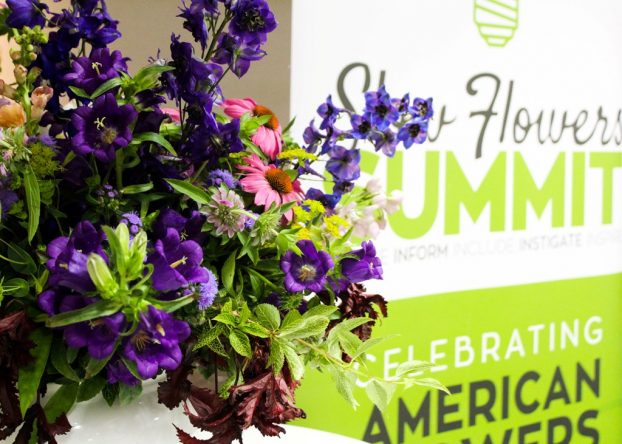
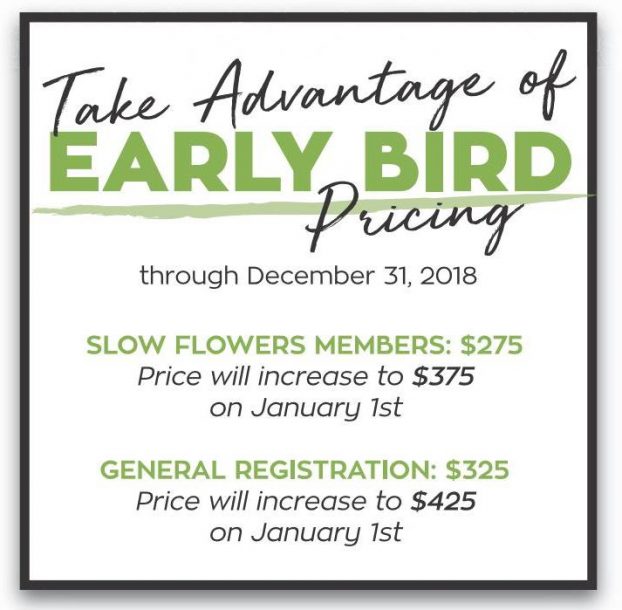 I want to encourage you to visit the Slow Flowers Summit site to learn more about the amazing program, people and flowers you’ll engage with next summer.
I want to encourage you to visit the Slow Flowers Summit site to learn more about the amazing program, people and flowers you’ll engage with next summer.
It’s not too early to save the date and secure your seat!
Slow Flowers members receive special discount pricing and everyone receives $100 off with the Early Bird rate, on sale now!
Please come back next week where you’ll hear another amazing episode featuring the leading voices in our Slow Flowers Community.
 We have a vital and vibrant community of flower farmers and floral designers who together define the Slow Flowers Movement.
We have a vital and vibrant community of flower farmers and floral designers who together define the Slow Flowers Movement.
As our cause gains more supporters and more passionate participants who believe in the importance of the American cut flower industry, the momentum is contagious.
I know you feel it, too. I value your support and invite you to show your thanks and with a donation to support my ongoing advocacy, education and outreach activities.
You can find the donate button in the column to the right.
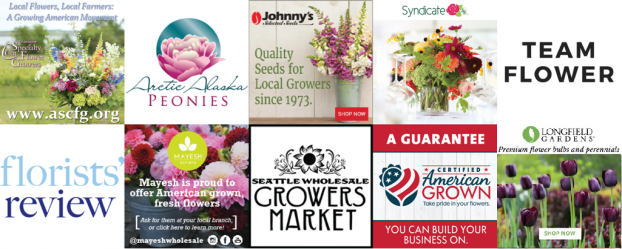 The Slow Flowers Podcast has been downloaded more than 372,000 times by listeners like you. Thank you for listening, commenting and sharing – it means so much.
The Slow Flowers Podcast has been downloaded more than 372,000 times by listeners like you. Thank you for listening, commenting and sharing – it means so much.
Thank you to our Podcast Sponsors, including our lead sponsor for 2018, Florists’ Review magazine. I’m delighted to serve as Contributing Editor for Slow Flowers Journal, found in the pages of Florists’ Review. It’s the leading trade magazine in the floral industry and the only independent periodical for the retail, wholesale and supplier market.
Arctic Alaska Peonies, a cooperative of passionate family farms in the heart of Alaska providing bigger, better peony flowers during the months of July and August. Visit them today at arcticalaskapeonies.com
Seattle Wholesale Growers Market, a farmer-owned cooperative committed to providing the very best the Pacific Northwest has to offer in cut flowers, foliage and plants. The Growers Market’s mission is to foster a vibrant marketplace that sustains local flower farms and provides top-quality products and service to the local floral industry. Find them at seattlewholesalegrowersmarket.com
Longfield Gardens provides home gardeners with high quality flower bulbs and perennials. Their online store offers plants for every region and every season, from tulips and daffodils to dahlias, caladiums and amaryllis. Visit them at longfield-gardens.com.
Syndicate Sales, an American manufacturer of vases and accessories for the professional florist. Look for the American Flag Icon to find Syndicate’s USA-made products and join the Syndicate Stars loyalty program at syndicatesales.com.
Johnny’s Selected Seeds, an employee-owned company that provides our industry the best flower, herb and vegetable seeds — supplied to farms large and small and even backyard cutting gardens like mine. Check them out at johnnysseeds.com.
Association of Specialty Cut Flower Growers. Formed in 1988, ASCFG was created to educate, unite, and support commercial cut flower growers. It mission is to help growers produce high-quality floral material, and to foster and promote the local availability of that product. Learn more at ascfg.org
Mayesh Wholesale Florist. Family-owned since 1978, Mayesh is the premier wedding and event supplier in the U.S. and we’re thrilled to partner with Mayesh to promote local and domestic flowers, which they source from farms large and small around the U.S. Learn more at mayesh.com.
Certified American Grown Flowers. The Certified American-Grown program and label provide a guarantee for designers and consumers on the source of their flowers. Take pride in your flowers and buy with confidence, ask for Certified American Grown Flowers. To learn more visit americangrownflowers.org.
And the Team Flower Conference – a professional floral event where flower lovers from all over the world gather for networking, learning, and celebration. It’s a special time for the floral industry to come together and whether you’re a farmer, designer, wholesaler, or just love flowers, you’re invited to attend as Team Flowers dreams big for the industry’s future. Head to teamflower.org/slowflowers to learn more about the 2019 conference in Waco, Texas!
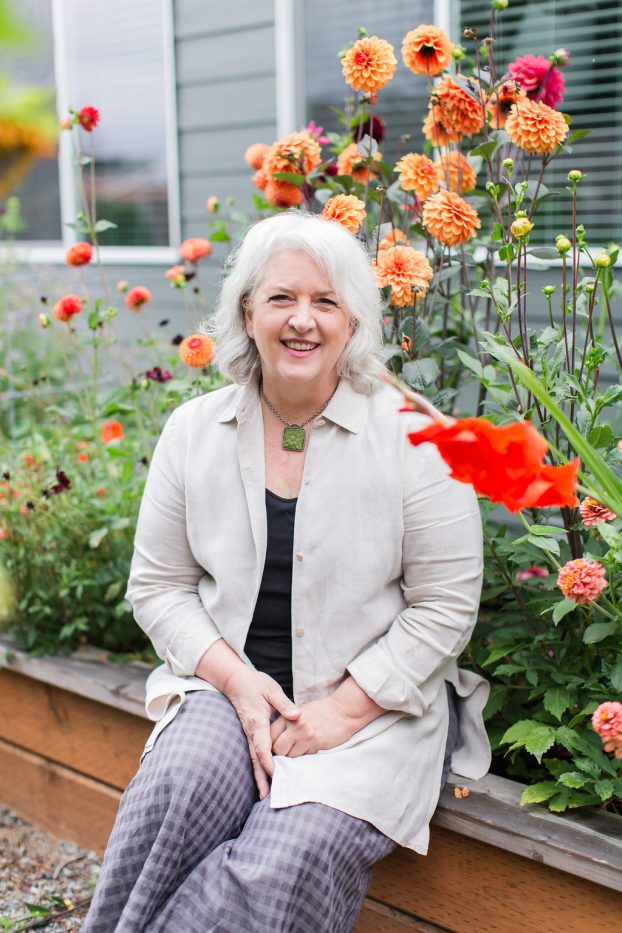
(c) Missy Palacol Photography
I’m Debra Prinzing, host and producer of the Slow Flowers Podcast.
Next week, you’re invited to join me in putting more American grown flowers on the table, one vase at a time. And If you like what you hear, please consider logging onto iTunes and posting a listener review.
The content and opinions expressed here are either mine alone or those of my guests alone, independent of any podcast sponsor or other person, company or organization.
The Slow Flowers Podcast is engineered and edited by Andrew Brenlan. Learn more about his work at soundbodymovement.com.
Music Credits:
Betty Dear
by Blue Dot Sessions
Posted in American Grown, Blog Posts, Creativity, Entertainment, floral design, Flower Farming, Plants, Playfulness, Podcast Episodes, SLOW FLOWERS Podcast, Slowflowers.com the Directory of American Flowers, Storytelling, Writing | No Comments »
October 17th, 2018
Podcast: Play in new window | Download
Subscribe: Apple Podcasts | Podcast Index | | More
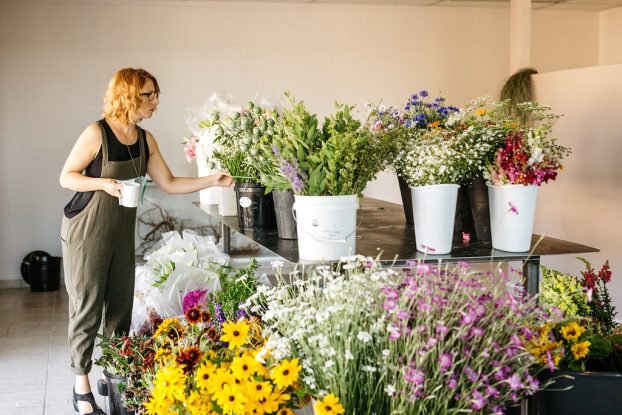
Opening day of the Michigan Flower Growers Co-op, with one of the first customers, Susan McLeary of Passionflower.
I’m so excited to have you with me today because in addition to our fabulous episode addressing the timely topic of Regional Wholesale Flower Hubs, I want to announce the opening of Early Bird Pre-Registration for the 2019 Slow Flowers Summit!
 Yes, it’s so great to be able to unveil our program for the 3rd annual Summit, which will take place on July 1 & 2nd 2019 in St. Paul Minnesota, co-hosted with Twin Cities Flower Exchange. Find all the details here, at slowflowerssummit.com.
Yes, it’s so great to be able to unveil our program for the 3rd annual Summit, which will take place on July 1 & 2nd 2019 in St. Paul Minnesota, co-hosted with Twin Cities Flower Exchange. Find all the details here, at slowflowerssummit.com.
The Slow Flowers Summit is designed to meet the needs and interests of progressive floral entrepreneurs engaged in sustainable sourcing, design and business practices. Your registration covers local flower tours, floral demonstrations, participation in creating an interactive, large-scale installation, all meals and 10 inspiring and informative speakers from across the floral continuum.
Now’s your chance to take advantage of early-bird pricing through December 31st.
- Slow Flowers members enjoy the discounted registration of $275
- General admission is $325.
- Ticket prices at both levels will increase by $100 on January 1st so if you want to drop hints for a holiday-wish list or if you want to invest in an tax-deductible business expense before the end of the year, the Summit registration might just have your name on it! I can’t wait to see you there!
As I mentioned, the Summit’s co-host is Twin Cities Flower Exchange and our partner is founder Christine Hoffman, a past guest of this podcast. Christine’s innovative efforts to create a regional wholesale flower hub in the Twin Cities is one of the reasons I wanted to bring the Summit there. As part of our Summit programming, Christine will be joined by two other leaders in farm-to-florist wholesaling. Theirs are important, emerging models we’re witnessing in markets around North America.
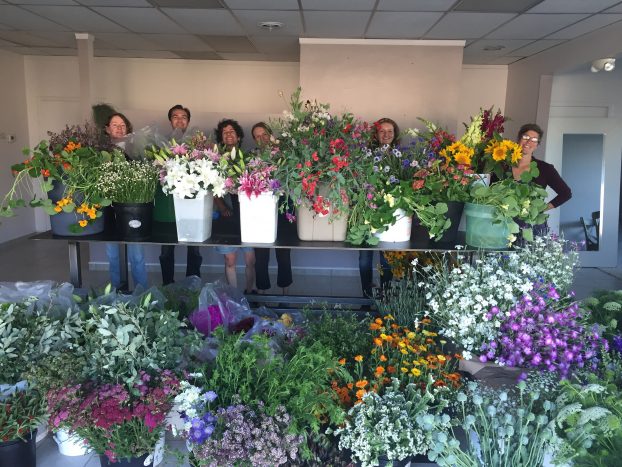
The Michigan Flower Growers Cooperative is a magnetic hub of flowers, flower farmer and floral designers.
It’s timely that one of Christine’s fellow panelists is with us today, along with one of her collaborators. Please welcome farmer-florist Amanda Maurmann of Gnome Grown Flowers and Alex Cacciari of Seeley Farm. Together, they represent the exciting Michigan Flower Growers Cooperative.
Amanda will join Christine at the Summit to share insights, lessons learned and strategies for how the Michigan Flower Growers Cooperative came to be; our third panel presenter will be Nichole Skalski of Sonoma Flower Mart, a past guest of this podcast.
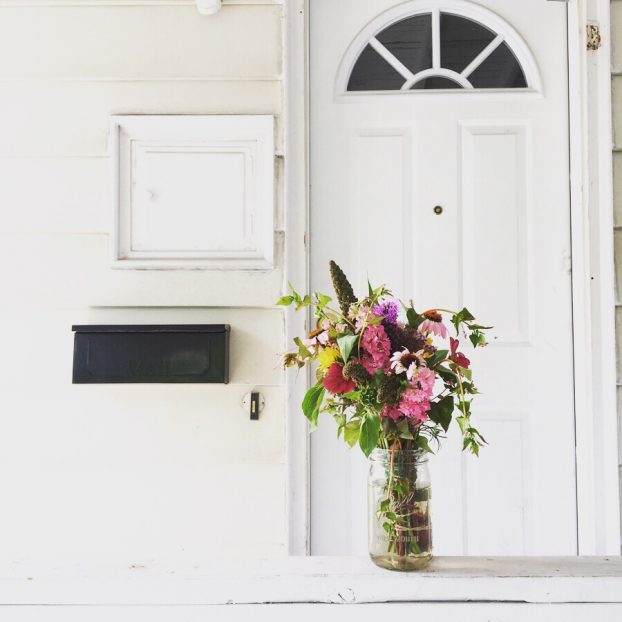
A welcoming bouquet, grown and designed by Amanda Maurmann of Gnome Grown Flowers
The session will explore various models and strategies for developing a local-flowers-focused regional wholesale flower hub. I’ve heard from so many around the country who are hungry for this type of insight and resource — and I know it will be a valuable addition to the Summit programming.
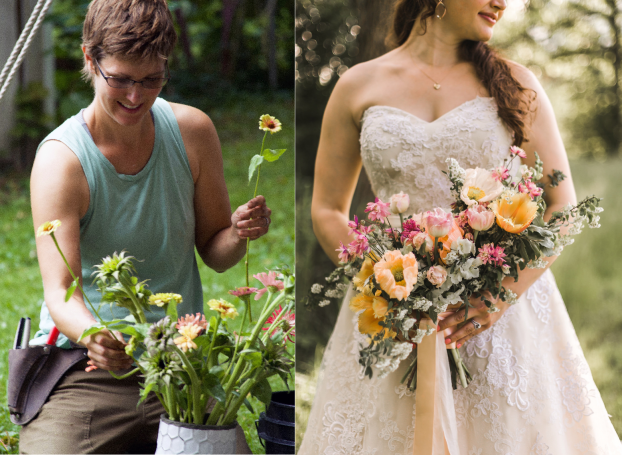
Farmer-florist Amanda Maurmann of Gnome Grown Flowers, along with one of her Michigan-grown bouquet designs.
Let me tell you a little more about both guests. Amanda and her family own and run a small cut flower farm and design studio out in Ann Arbor, Michigan. She utilizes organic and sustainable practices and loves growing a diversity of unique and interesting blooms that inspire creative and natural design.
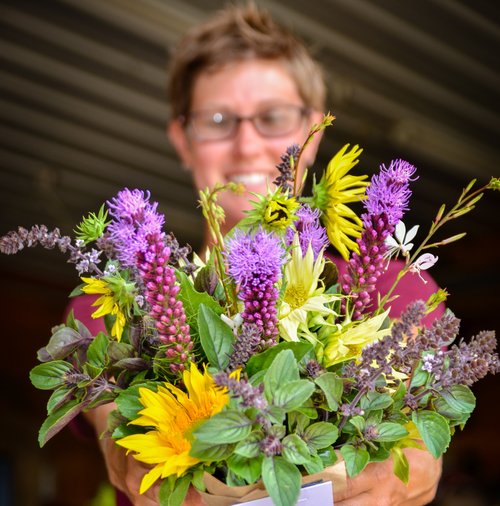
Amanda Maurmann of Gnome Grown Flowers and Michigan Flower Growers Cooperative.
She designs for small weddings, events, and funerals, and also cooperates with local farms that provide u-pick flowers for the public. Amanda works with what is in season first, and loves to collaborate with other local growers.
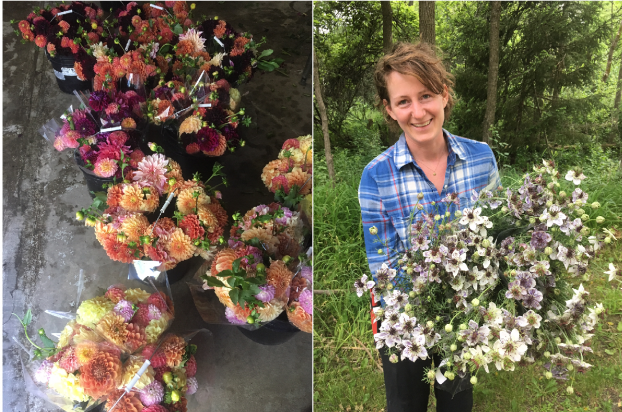
Alex Cacciari of Seeley Farm, along with her lush and fresh Michigan flowers.
Alex Cacciari and her husband Mark Nowak own and operate Seeley Farm in Ann Arbor. They grow certified organic vegetables and cut flowers for sale to farmers’ markets, chefs and grocery stores.
Alex says she got bit by the flower bug five years ago when she planted two beds of mixed flowers as an afterthought, along with the vegetable plantings.
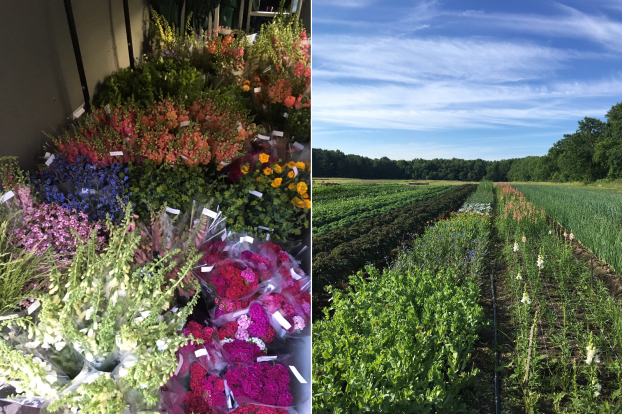
Beautiful scenes from Seeley Farm, owned by Alex Cacciari and her husband Mark Nowak.
Those two beds quickly grew to almost a half acre of mixed annual flowers and foliage, an expanding collection of dahlias, and new perennial plantings every year. Alex likes to arrange with unique ingredients like foraged greenery, vegetables and herbs. She also has been experimenting with lots of everlasting varieties as a way to enjoy locally grown flowers all season long.
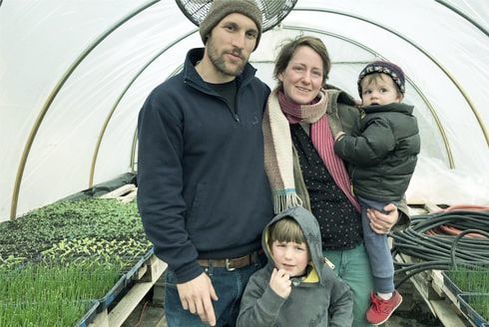
The family behind Seeley Farm!
In 2016, Amanda and Alex, along with a cohort of other flower growers, started the Michigan Flower Growers’ Cooperative to serve the needs of growers through marketing and distribution of their products to the wholesale market.
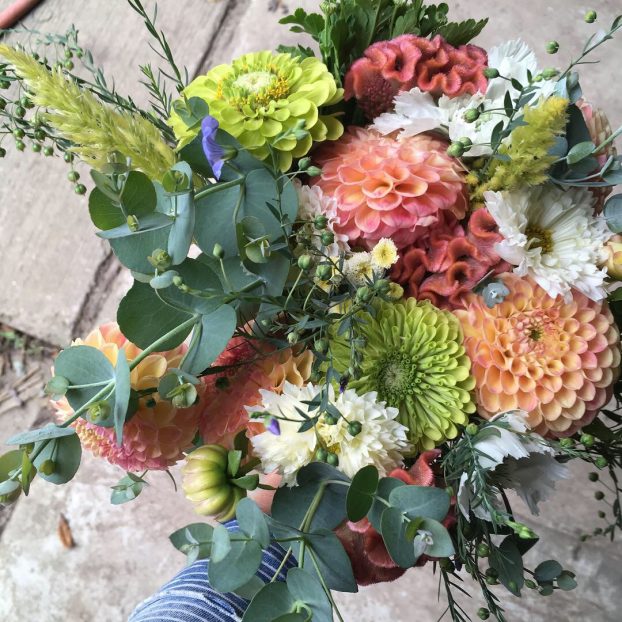
Seasonal, local and sustainably-raised blooms from Gnome Grown Flower Farm.
Thanks so much for joining me today as you heard the story of a new model for selling locally-grown flowers in Michigan and enjoyed a wonderful preview to the upcoming presentation, Farm-to-Florist: Seeding and Growing a Regional Flower Hub, at the 2019 Slow Flowers Summit.
Take time to visit the link above to learn more about the amazing program, people and flowers you’ll engage with next summer. It’s not too early to save the date and secure your seat!
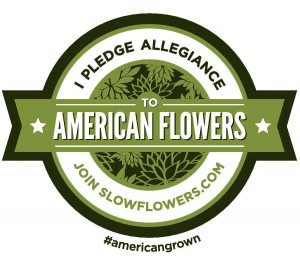
Take the Pledge!!!
We have a vital and vibrant community of flower farmers and floral designers who together define the Slow Flowers Movement.
As our cause gains more supporters and more passionate participants who believe in the importance of the American cut flower industry, the momentum is contagious.
I know you feel it, too. I value your support and invite you to show your thanks and with a donation to support my ongoing advocacy, education and outreach activities. You can find the donate button in the column to the right.
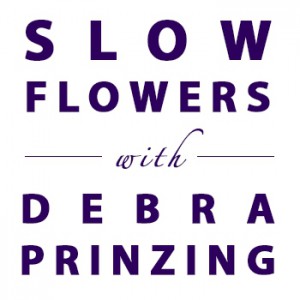 The Slow Flowers Podcast has been downloaded more than 369,000 times by listeners like you.
The Slow Flowers Podcast has been downloaded more than 369,000 times by listeners like you.
Thank you for listening, commenting and sharing – it means so much.
Thank you to our sponsors who have supported Slow Flowers and all our programs.

Florists’ Review magazine. I’m delighted to serve as Contributing Editor for Slow Flowers Journal, found in the pages of Florists’ Review. It’s the leading trade magazine in the floral industry and the only independent periodical for the retail, wholesale and supplier market.
Arctic Alaska Peonies, a cooperative of passionate family farms in the heart of Alaska providing bigger, better peony flowers during the months of July and August. Visit them today at arcticalaskapeonies.com
Seattle Wholesale Growers Market, a farmer-owned cooperative committed to providing the very best the Pacific Northwest has to offer in cut flowers, foliage and plants. The Growers Market’s mission is to foster a vibrant marketplace that sustains local flower farms and provides top-quality products and service to the local floral industry. Find them at seattlewholesalegrowersmarket.com
Longfield Gardens provides home gardeners with high quality flower bulbs and perennials. Their online store offers plants for every region and every season, from tulips and daffodils to dahlias, caladiums and amaryllis. Visit them at longfield-gardens.com.
Syndicate Sales, an American manufacturer of vases and accessories for the professional florist. Look for the American Flag Icon to find Syndicate’s USA-made products and join the Syndicate Stars loyalty program at syndicatesales.com.
Johnny’s Selected Seeds, an employee-owned company that provides our industry the best flower, herb and vegetable seeds — supplied to farms large and small and even backyard cutting gardens like mine. Check them out at johnnysseeds.com.
Association of Specialty Cut Flower Growers. Formed in 1988, ASCFG was created to educate, unite, and support commercial cut flower growers. It mission is to help growers produce high-quality floral material, and to foster and promote the local availability of that product. Learn more at ascfg.org
Mayesh Wholesale Florist. Family-owned since 1978, Mayesh is the premier wedding and event supplier in the U.S. and we’re thrilled to partner with Mayesh to promote local and domestic flowers, which they source from farms large and small around the U.S. Learn more at mayesh.com.
Certified American Grown Flowers. The Certified American-Grown program and label provide a guarantee for designers and consumers on the source of their flowers. Take pride in your flowers and buy with confidence, ask for Certified American Grown Flowers. To learn more visit americangrownflowers.org.
And the Team Flower Conference – a professional floral event where flower lovers from all over the world gather for networking, learning, and celebration. It’s a special time for the floral industry to come together and whether you’re a farmer, designer, wholesaler, or just love flowers, you’re invited to attend as Team Flowers dreams big for the industry’s future. Head to teamflower.org/slowflowers to learn more about the 2019 conference in Waco, Texas!
I’m Debra Prinzing, host and producer of the Slow Flowers Podcast.
Next week, you’re invited to join me in putting more American grown flowers on the table, one vase at a time. And If you like what you hear, please consider logging onto iTunes and posting a listener review.
The content and opinions expressed here are either mine alone or those of my guests alone, independent of any podcast sponsor or other person, company or organization.
The Slow Flowers Podcast is engineered and edited by Andrew Brenlan. Learn more about his work at soundbodymovement.com.
Music Credits:
Mind Body Mind
by Blue Dot Sessions
Perfect (Instrumental Version)
Posted in American Flowers Week, Blog Posts, Creativity, floral design, Flower Farming, Podcast Episodes, SLOW FLOWERS Podcast, Slowflowers.com the Directory of American Flowers | No Comments »
October 10th, 2018
Podcast: Play in new window | Download
Subscribe: Apple Podcasts | Podcast Index | | More
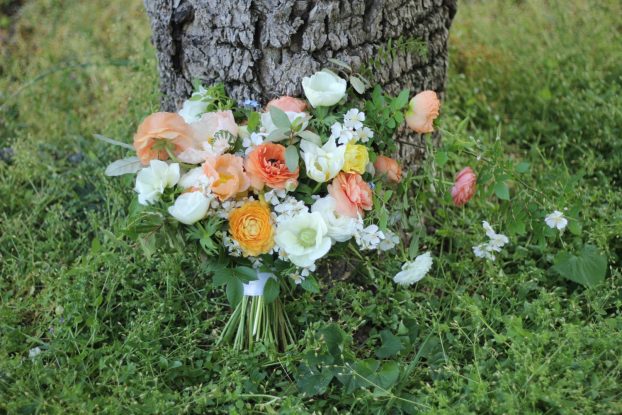
“I grow wedding flowers,” says today’s guest, Melissa Smith of Fraylick Farm in Traveler’s Rest, S.C.

Flower farmer Melissa Smith from Fraylick Farm and SC Upstate Flowers (c) Kimberly Michelle Gibson Photography
I met today’s guest, flower farmer Melissa Smith,along with several others in the SC Upstate Flowers group a few years ago when they came to the Slow Flowers Meet-Up in the Raleigh-Durham, N.C. area.
I found their sense of collaboration and mutual respect for one another very encouraging, because they are basically creating a new market in their region.
Melissa and her husband Josh Smith own Fraylick Farm, based in Travelers Rest, S.C., about 10 miles north of Greenville, S.C., and 10 miles south of the S.C.-N.C. state line.
“The state of South Carolina in general is getting a whole lot more flower-focused,” she told me in a phone interview.
When Melissa and Josh moved their farming operation to the Greenville area in October 2015, Melissa felt the need for community. “I started meeting people through the Flower Farmer group on Facebook and I knew there were at least five of us here – and I thought ‘that’s enough for a group.’”
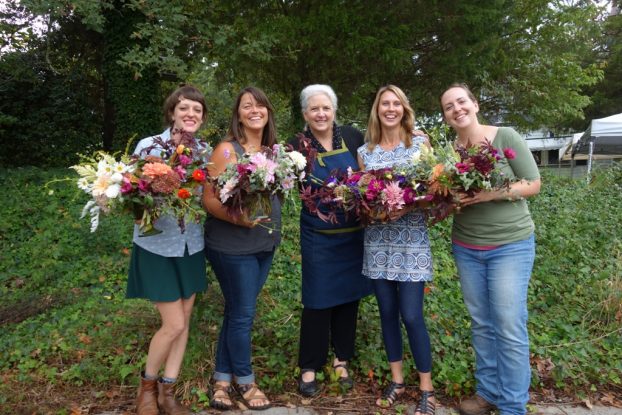
This image captures the collaborative spirit I enjoyed when I visited the Raleigh-Durham area in September 2016 and connected with Melissa Smith (far right) and others in the SC Upstate Flowers group.
She teamed up with Julie Hill of Greenville-based Southern Wild Design and invited every flower farmer they knew about to a potluck dinner. “We ended up having eight and that’s where the idea for our group was born.”
Thanks to Melissa’s background in graphic design and computers, and since it was still early in the season, SC Upstate Flowers launched a simple web site in March 2016. A Facebook page and Instagram account, and the frequently-used hashtag #scupstateflowers, naturally followed. By the first weekend of April 2016, SC Upstate Flowers posted a wholesale availability/price list on its site and introduced itself by email to a list of florists in the area.
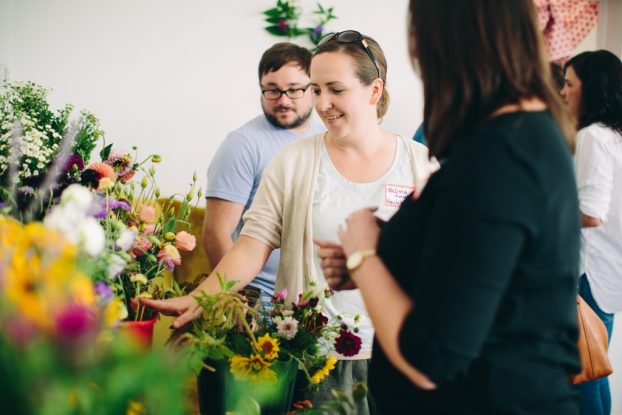
Melissa Smith of Fraylick Farm shows off local flowers at the 2016 American Flowers Week “Farmer-Florist” Party (c) Angela Zion
SC Upstate Flowers has produced a few fun events during American Flowers Week — basically a Farmer-Florist Design Party that invites florists in their area to play with the freshest, most beautiful, just-picked flowers from local farms.
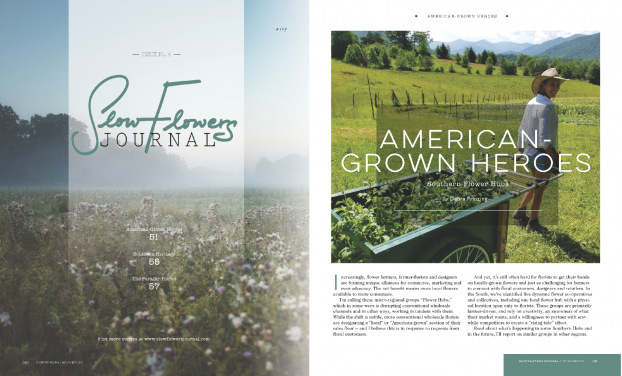
Featured in Slow Flowers Journal/Florists’ Review: Southern Flower Hubs
SC Upstate Flowers is also included in an article I wrote last November 2017 for the Slow Flowers Journal section of Florists’ Review. That was the Southern-themed issue, and we focused the editorial content on floral design in the American South.
My story, titled “American-Grown Heroes: Southern Flower Hubs,” features five dynamic flower cooperatives and collectives. You can download Southern Flower Hubs as a free PDF here.
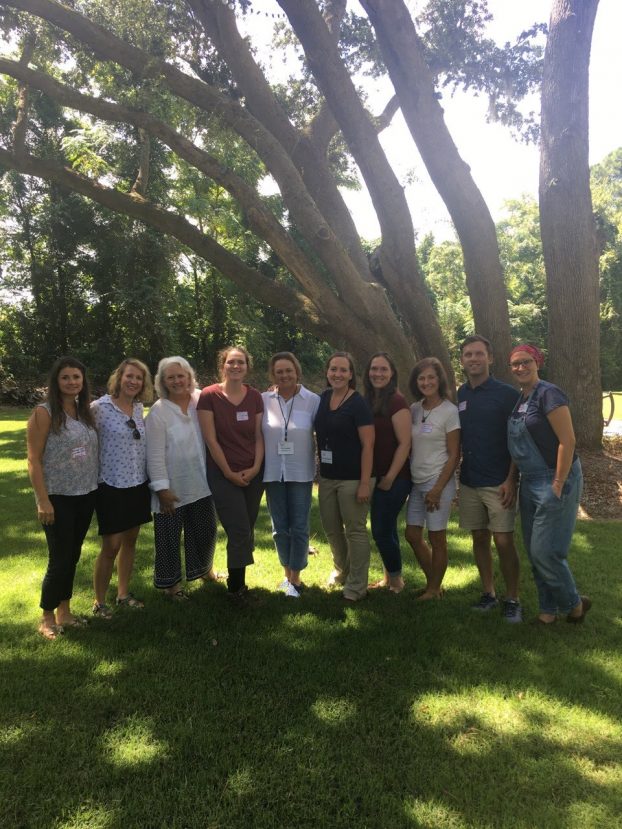
I gathered with a number of passionate members of the SC Upstate Flower Growers in August, at the Southern Flower Symposium.
I reunited with Melissa in late August at the Southern Flowers Symposium in Charleston, S.C., hosted by Lowcountry Flower Growers. I spoke about the 2019 Slow Flowers Forecast and Melissa joined a panel of growers at various levels to discuss flower farming practices and share their wisdom.
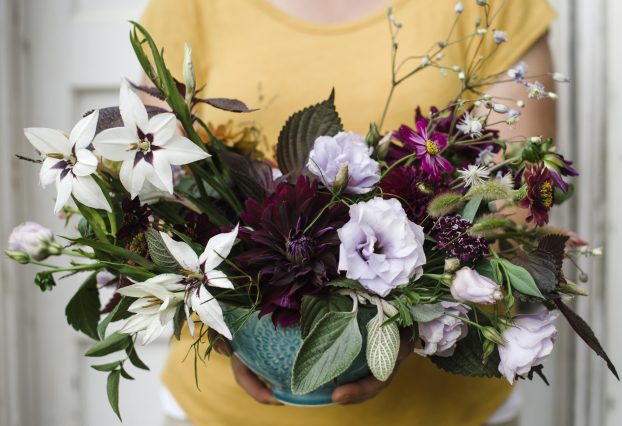
Flowers by Fraylick Farm (c) Kimberly Michelle Gibson Photography
We managed to grab about 15 minutes to record a quick interview, but I knew there was more you could learn if we had more time. I recently connected via Skype with Melissa to finish our conversation. I’m so glad we took the time to do so. You’ll learn how she is managing the evolution of her flower farm, adapting to market shifts and opportunities. And you’ll learn more about the SC Upstate Flowers group.
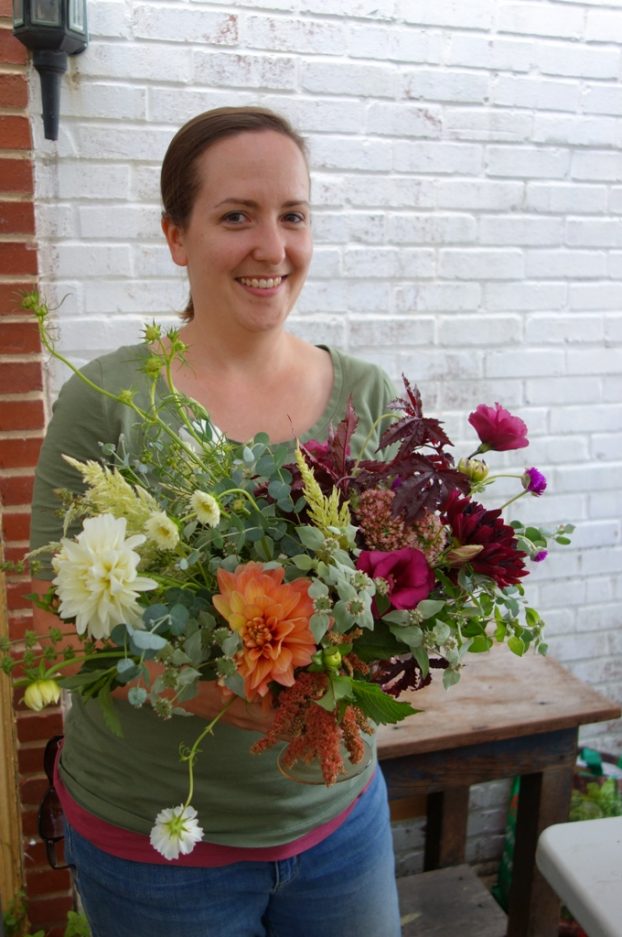
Love this photo of Melissa Smith that I took at the Slow Flowers Creative Workshop in Raleigh-Durham a few years back.
Here’s a little more about Melissa, excerpted from the Fraylick Farm web site:
Melissa and Josh Smith run Fraylick Farm in Travelers Rest, South Carolina. They are producers of specialty cut flowers and pastured pork, saying: “we aim to produce the most beautiful flowers you’ve ever seen and the best pork you’ve ever tasted.” Josh’s Ossabaw Island pigs are raised to forest-forage through the woods, eating the local flora as well as seasonal cover crops.
Fraylick Farm’s flowers are grown without harmful pesticides or chemicals to provide not only beauty but serve as valuable hosts to beneficial insects and pollinators. The farm serves the local florist trade and the public.
Find Melissa and her flowers at these social places:
Fraylick Farm on Facebook
Fraylick Farm on Instagram
Melissa’s Flwrtherapy on Instagram
SC Upstate Flowers on Instagram
Thanks so much for joining me today as you heard in real time how Melissa is planning to re-brand her farm with the tagline: We Grow Wedding Flowers. I love that idea so much! Look for the new hashtag showing up, too.
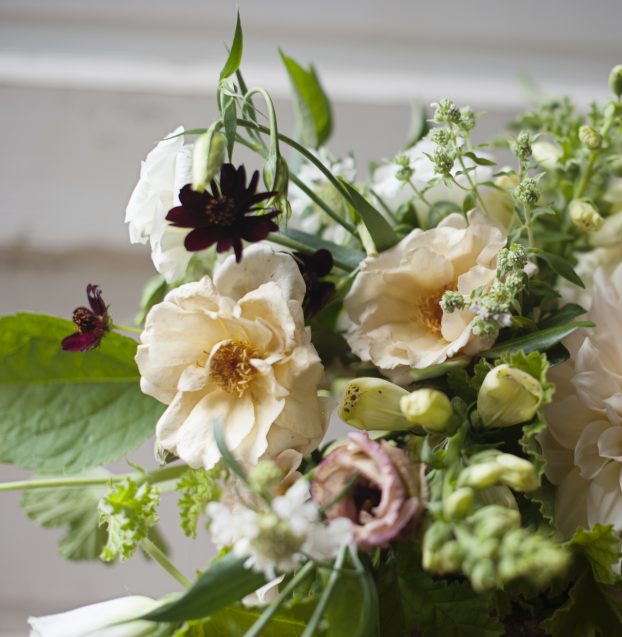
More beautiful wedding flowers grown by Melissa Smith of Fraylick Farm, (c) Kimberly Michelle Gibson Photography
 We have a vital and vibrant community of flower farmers and floral designers who together define the Slow Flowers Movement. As our cause gains more supporters and more passionate participants who believe in the importance of the American cut flower industry, the momentum is contagious.
We have a vital and vibrant community of flower farmers and floral designers who together define the Slow Flowers Movement. As our cause gains more supporters and more passionate participants who believe in the importance of the American cut flower industry, the momentum is contagious.
I know you feel it, too. I value your support and invite you to show your thanks and with a donation to support my ongoing advocacy, education and outreach activities. You can find the donate button in the column to the right.
The Slow Flowers Podcast has been downloaded more than 367,000 times by listeners like you. Thank you for listening, commenting and sharing – it means so much.

Thank you to our Slow Flowers Podcast Sponsors for 2018:
And thank you to our lead sponsor for 2018, Florists’ Review magazine. I’m delighted to serve as Contributing Editor for Slow Flowers Journal, found in the pages of Florists’ Review. It’s the leading trade magazine in the floral industry and the only independent periodical for the retail, wholesale and supplier market.
Arctic Alaska Peonies, a cooperative of passionate family farms in the heart of Alaska providing bigger, better peony flowers during the months of July and August. Visit them today at arcticalaskapeonies.com
Seattle Wholesale Growers Market, a farmer-owned cooperative committed to providing the very best the Pacific Northwest has to offer in cut flowers, foliage and plants. The Growers Market’s mission is to foster a vibrant marketplace that sustains local flower farms and provides top-quality products and service to the local floral industry. Find them at seattlewholesalegrowersmarket.com
Longfield Gardens provides home gardeners with high quality flower bulbs and perennials. Their online store offers plants for every region and every season, from tulips and daffodils to dahlias, caladiums and amaryllis. Visit them at longfield-gardens.com.
Syndicate Sales, an American manufacturer of vases and accessories for the professional florist. Look for the American Flag Icon to find Syndicate’s USA-made products and join the Syndicate Stars loyalty program at syndicatesales.com.
Johnny’s Selected Seeds, an employee-owned company that provides our industry the best flower, herb and vegetable seeds — supplied to farms large and small and even backyard cutting gardens like mine. Check them out at johnnysseeds.com.
Association of Specialty Cut Flower Growers. Formed in 1988, ASCFG was created to educate, unite, and support commercial cut flower growers. It mission is to help growers produce high-quality floral material, and to foster and promote the local availability of that product. Learn more at ascfg.org
Mayesh Wholesale Florist. Family-owned since 1978, Mayesh is the premier wedding and event supplier in the U.S. and we’re thrilled to partner with Mayesh to promote local and domestic flowers, which they source from farms large and small around the U.S. Learn more at mayesh.com.
Certified American Grown Flowers. The Certified American-Grown program and label provide a guarantee for designers and consumers on the source of their flowers. Take pride in your flowers and buy with confidence, ask for Certified American Grown Flowers. To learn more visit americangrownflowers.org.
And the Team Flower Conference – a professional floral event where flower lovers from all over the world gather for networking, learning, and celebration. It’s a special time for the floral industry to come together and whether you’re a farmer, designer, wholesaler, or just love flowers, you’re invited to attend as Team Flowers dreams big for the industry’s future. Head to teamflower.org/slowflowers to learn more about the 2019 conference in Waco, Texas!
I’m Debra Prinzing, host and producer of the Slow Flowers Podcast. Next week, you’re invited to join me in putting more American grown flowers on the table, one vase at a time. And If you like what you hear, please consider logging onto iTunes and posting a listener review.
The content and opinions expressed here are either mine alone or those of my guests alone, independent of any podcast sponsor or other person, company or organization.
The Slow Flowers Podcast is engineered and edited by Andrew Brenlan. Learn more about his work at soundbodymovement.com.
Music Credits:
Feathersoft; One Needle
by Blue Dot Sessions
Posted in American Flowers Week, American Grown, Blog Posts, Creativity, floral design, Flower Farming, Podcast Episodes, SLOW FLOWERS Podcast, Slowflowers.com the Directory of American Flowers | 1 Comment »
October 3rd, 2018
Podcast: Play in new window | Download
Subscribe: Apple Podcasts | Podcast Index | | More
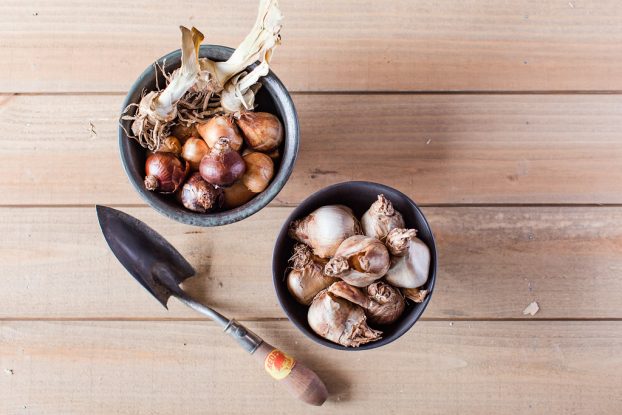
It’s time to plan and plant our spring-flowering bulbs! The anticipation of their colors, forms and fragrances in my garden — and vases — will carry me through the wet, gray months of winter! (c) Missy Palacol Photography

Here are three Longfield Gardens’ collections I’ll be planting in the Slow Flowers Cutting Garden this fall! From left: “Daring Forms” alliums; “Golden Glow” collection of narcissi and muscari; and “Flower Arrangers” tulip collection.
It’s October 3rd and for most of us around the country, it’s time to start thinking about planting our bulbs for next spring!
I recently immersed myself in this topic, thanks to an assignment from Garden Design magazine, whose editors asked me to interview Chanticleer Gardens’ plant information coordinator Eric Hsu. The article, “Planted Palettes,” is out in the magazine’s Autumn 2018.
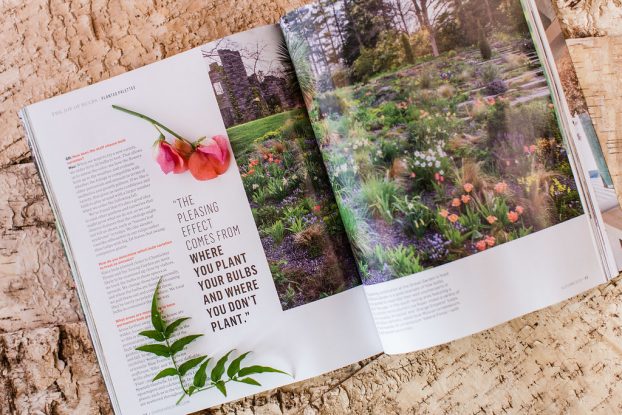
The Fall 2018 issue of Garden Design magazine features my article and Rob Cardillo’s images about spring bulb design at Chanticleer Gardens (c) Missy Palacol Photography
In writing the story, I learned volumes about designing spring landscapes and container gardens with familiar and unfamiliar bulbs. My 14-page article is illustrated with gorgeous images from Rob Cardillo, an award-winning photographer I’ve known for years through the Garden Writers Association. You’ll love every page, and the publication of what Garden Design magazine is calling its “Joy of Bulbs” issue has inspired me to focus on bulbs in today’s podcast.
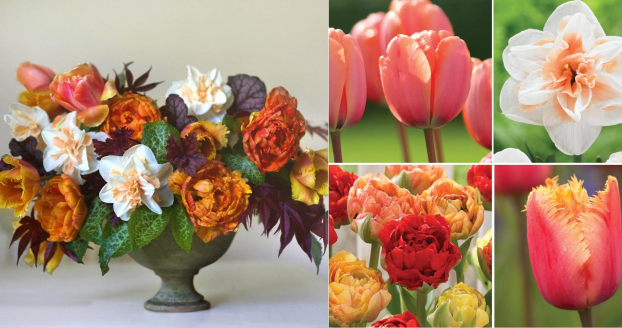
One of the most dazzling Longfield Gardens collections available to plant this fall! Designed by Alicia Schwede of Flirty Fleurs, the “Baroque” bulb collection.

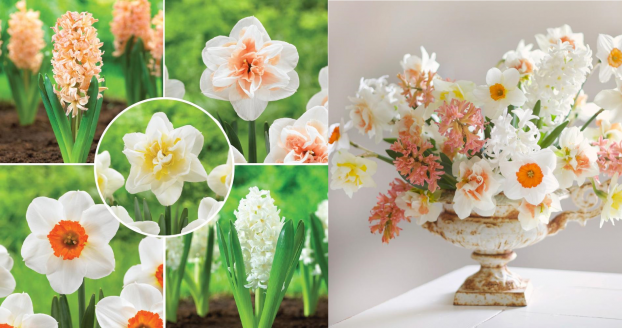
Another beautiful bulb collection, curated for Longfield Gardens by Alicia Schwede of Flirty Fleurs, called “Somerset”
I’ve wanted to visit Longfield Gardens’ U.S. headquarters in Lakewood, New Jersey, for a number of years. A trip to Philadelphia last week brought me pretty close to that spot, so I invited myself out to the Jersey Shore, about 90 minutes east of Philadelphia, to tour Longfields’ bulb operations and trial/test gardens.
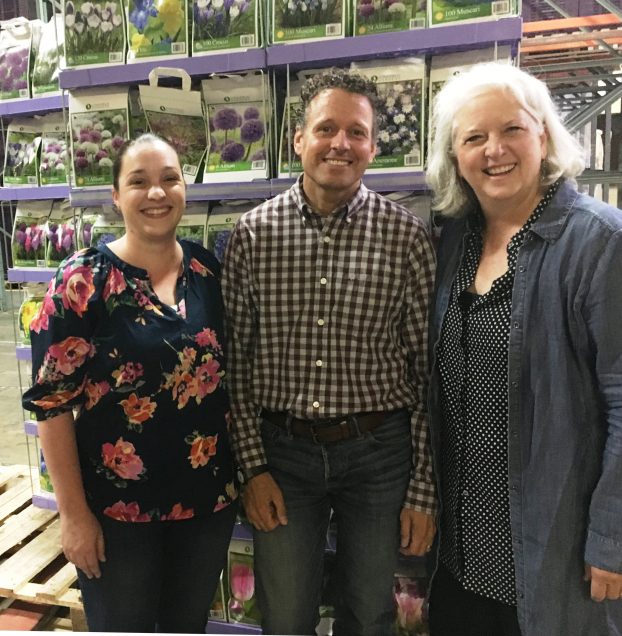
Slow Flowers visits Longfield Gardens! From left, Jen Pfau, Hans Langeveld and Debra Prinzing
My thanks to Longfield for sponsoring Slow Flowers for a number of years. I’ve worked closely with Kathleen Laliberte on bulb-themed stories and promotions and it’s Kathleen who helped arrange my visit. I’m so grateful that it all worked out to spend a morning there and meet with today’s guests, Hans Langeveld, co-owner of Longfield Gardens, and Jen Pfau, marketing director.
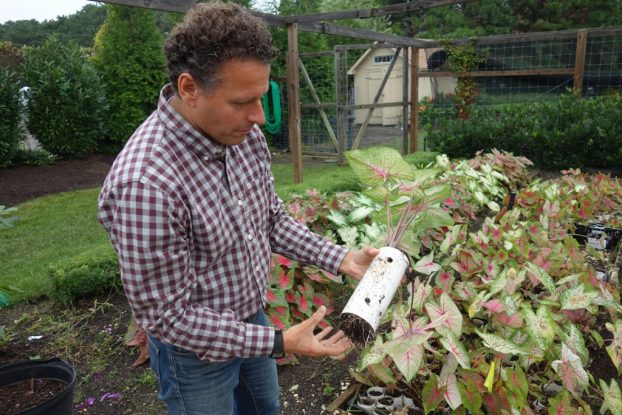
Hans Langeveld showed me how the caladium plants are grown for use in photo shoots! You can just pop these cylinder-planters into the landscape — easy!
Here’s a little bit more about them:
Hans Langeveld grew up in the heart of Holland’s bulb-growing region and has been involved in horticulture his entire professional career. As an enthusiastic gardener himself, he has a unique perspective on flowering bulbs that stretches from the breeders and growers in Holland to his own backyard in New Jersey. At Longfield Gardens, Hans is responsible for account management and quality control.
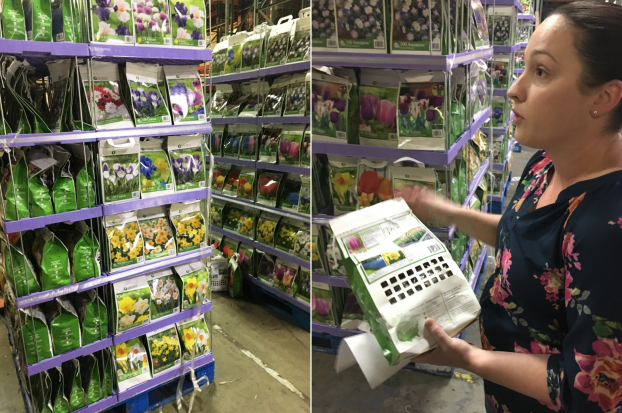
Left: The familiar packaging you’ll see at most Costco outlets this fall. Right: Jen Pfau shows the packaging’s planting and care instructions.
Jen Pfau grew up in a gardening family in New Jersey and graduated from the Cornell School of Agriculture with a degree in marketing. She joined Longfield Gardens in 2009 and launched the company’s online store in 2011. In addition to managing e-commerce, Jen is also deeply involved in the company’s wholesale business, where she oversees product selection, merchandising, marketing and the customer experience.
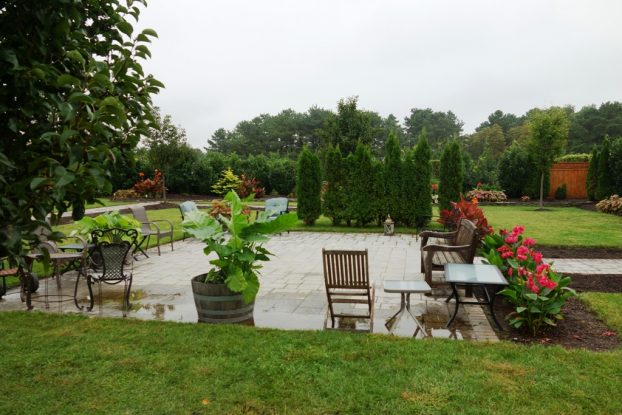
Yes, the dahlia season is winding down but the planting beds at Longfield’s Test and Display Garden in Lakewood, New Jersey, are ready for spring bulbs!
Here are some of the online resources from Longfield:
Find Longfield Gardens’ catalog of bulbs to order and plant this fall here.
Library of Resources and Articles about Fall-Planted Bulbs
Follow Longfield Gardens’ social places here:
Enjoy videos on planting and more.
Longfield Gardens on Facebook
Longfield Gardens on Instagram
Longfield Gardens on Pinterest
Longfield Gardens’ Blog
Fall is in the air and I think we’re all ready for it. That said, there’s still the promise of spring 2019, thanks to visions of bulbs in our dreams! Thanks so much for joining me today as we discussed all the things we need to know about bulb planting for cutting gardens, landscapes and containers.
We have a vital and vibrant community of flower farmers and floral designers who together define the Slow Flowers Movement. As our cause gains more supporters and more passionate participants who believe in the importance of the American cut flower industry, the momentum is contagious.
I know you feel it, too. I value your support and invite you to show your thanks and with a donation to support my ongoing advocacy, education and outreach activities. You can find the donate button in the column to the right.
The Slow Flowers Podcast has been downloaded more than 365,000 times by listeners like you. Thank you for listening, commenting and sharing – it means so much.

Thank you to our sponsors who have supported Slow Flowers and all our programs.
Florists’ Review magazine. I’m delighted to serve as Contributing Editor for Slow Flowers Journal, found in the pages of Florists’ Review. It’s the leading trade magazine in the floral industry and the only independent periodical for the retail, wholesale and supplier market.
Arctic Alaska Peonies, a cooperative of passionate family farms in the heart of Alaska providing bigger, better peony flowers during the months of July and August. Visit them today at arcticalaskapeonies.com
Seattle Wholesale Growers Market, a farmer-owned cooperative committed to providing the very best the Pacific Northwest has to offer in cut flowers, foliage and plants. The Growers Market’s mission is to foster a vibrant marketplace that sustains local flower farms and provides top-quality products and service to the local floral industry. Find them at seattlewholesalegrowersmarket.com
Longfield Gardens provides home gardeners with high quality flower bulbs and perennials. Their online store offers plants for every region and every season, from tulips and daffodils to dahlias, caladiums and amaryllis. Visit them at longfield-gardens.com.
Syndicate Sales, an American manufacturer of vases and accessories for the professional florist. Look for the American Flag Icon to find Syndicate’s USA-made products and join the Syndicate Stars loyalty program at syndicatesales.com.
Johnny’s Selected Seeds, an employee-owned company that provides our industry the best flower, herb and vegetable seeds — supplied to farms large and small and even backyard cutting gardens like mine. Check them out at johnnysseeds.com.
Association of Specialty Cut Flower Growers. Formed in 1988, ASCFG was created to educate, unite, and support commercial cut flower growers. It mission is to help growers produce high-quality floral material, and to foster and promote the local availability of that product. Learn more at ascfg.org
Mayesh Wholesale Florist. Family-owned since 1978, Mayesh is the premier wedding and event supplier in the U.S. and we’re thrilled to partner with Mayesh to promote local and domestic flowers, which they source from farms large and small around the U.S. Learn more at mayesh.com.
Certified American Grown Flowers. The Certified American-Grown program and label provide a guarantee for designers and consumers on the source of their flowers. Take pride in your flowers and buy with confidence, ask for Certified American Grown Flowers. To learn more visit americangrownflowers.org.
And the Team Flower Conference – a professional floral event where flower lovers from all over the world gather for networking, learning, and celebration. It’s a special time for the floral industry to come together and whether you’re a farmer, designer, wholesaler, or just love flowers, you’re invited to attend as Team Flowers dreams big for the industry’s future. Head to teamflower.org/slowflowers to learn more about the 2019 conference in Waco, Texas!
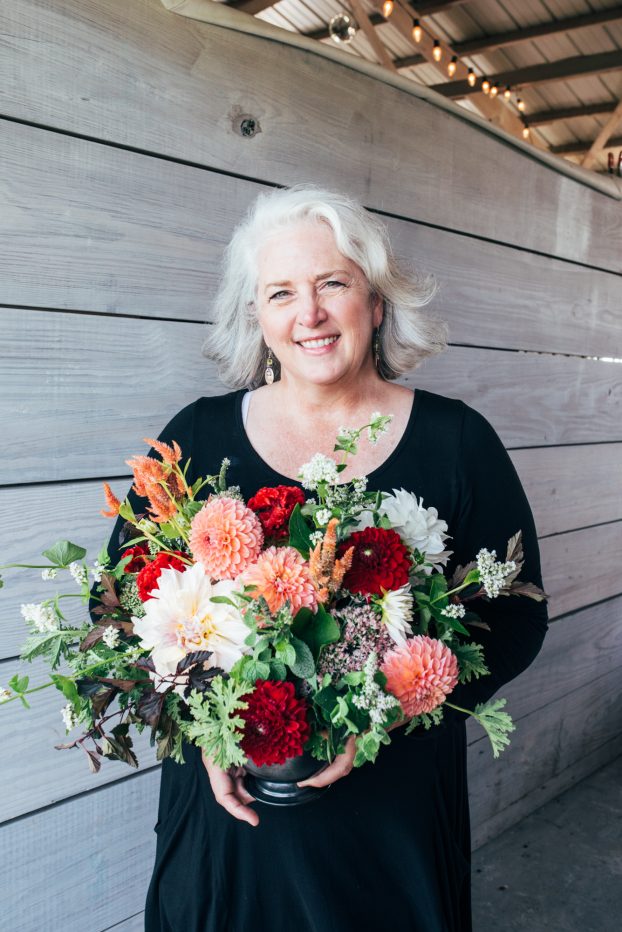
Debra Prinzing at PepperHarrow Farm on September 9, 2018. Photographed by Liz Brown @estorie
I’m Debra Prinzing, host and producer of the Slow Flowers Podcast.
Next week, you’re invited to join me in putting more American grown flowers on the table, one vase at a time. And If you like what you hear, please consider logging onto iTunes and posting a listener review.
The content and opinions expressed here are either mine alone or those of my guests alone, independent of any podcast sponsor or other person, company or organization.
The Slow Flowers Podcast is engineered and edited by Andrew Brenlan. Learn more about his work at soundbodymovement.com.
Music Credits:
Homegrown; A Palace Of Cedar
by Blue Dot Sessions
Posted in Blog Posts, Creativity, floral design, Gardening, Landscape Design, Plants, Podcast Episodes, SLOW FLOWERS Podcast, Slowflowers.com the Directory of American Flowers | 1 Comment »
September 26th, 2018
Podcast: Play in new window | Download
Subscribe: Apple Podcasts | Podcast Index | | More
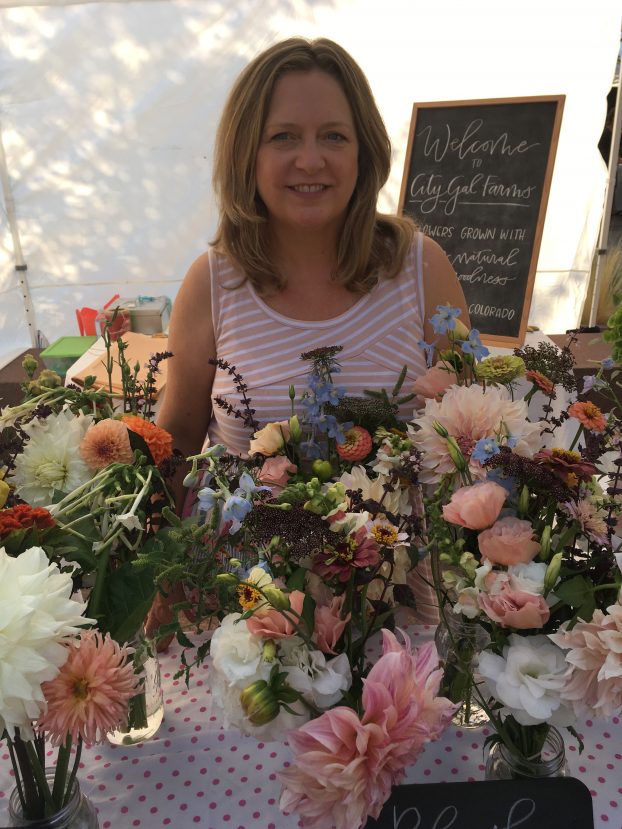
Kim Burton, owner of CityGal Farms.
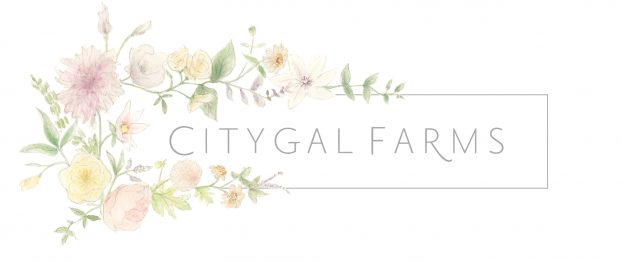 A few weeks ago, I spent three wonderful days in Denver, where I reconnected with my Slow Flowers friends and met many new ones.
A few weeks ago, I spent three wonderful days in Denver, where I reconnected with my Slow Flowers friends and met many new ones.
I was there as a guest of the Denver Botanic Gardens, returning for a second time as a featured presenter in the 2018 Bonfils-Stanton Lecture Series, “The Edge of Art and Gardens.”
 Hats off to the educational staff, including director Matthew Cole and associate director Sarah Olson and the other amazing staffers for making me feel welcome and for running such an excellent program.
Hats off to the educational staff, including director Matthew Cole and associate director Sarah Olson and the other amazing staffers for making me feel welcome and for running such an excellent program.
Slow Flowers was the program in September and it involved a lecture that I presented titled “American Beauty.”
As part of DBG’s commitment to bring its members into the larger community of horticulture and nature, the educational team asked me to help develop a series of field trips and workshops on flower farms during my time there.
I was so pleased to showcase three farms that mean a lot to me, including Slow Flowers members Red Daisy Farm and CityGal Farms, and The Fresh Herb Company, which is featured in the pages of The 50 Mile Bouquet.
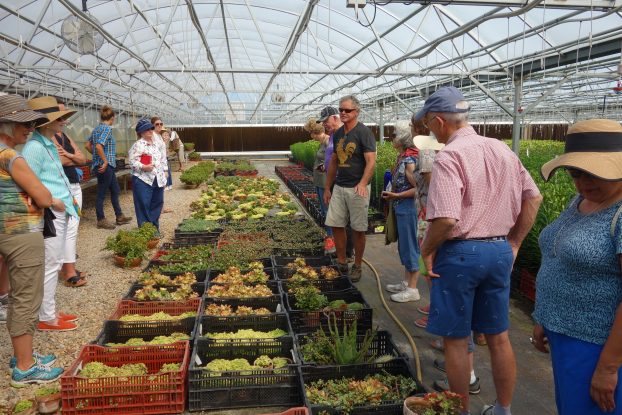
Chet (center) led a fabulous farm tour at The Fresh Herb Company in Longmont, Colorado.
We spent one day at The Fresh Herb Company in Longmont, Colorado, home of Chet and Kristy Anderson, for an extensive farm tour and catered lunch from a local farm-to-table purveyor.
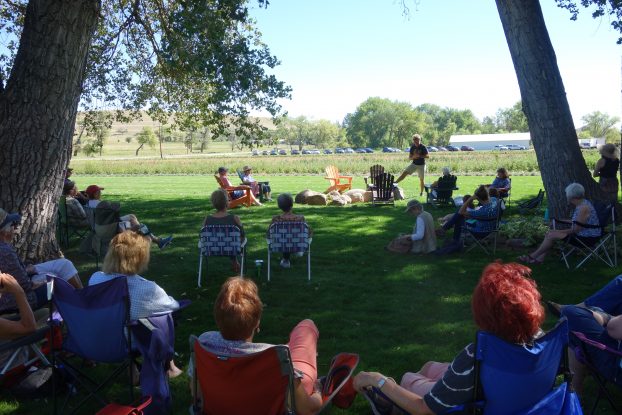
The Fresh Herb Company hosted our flower farm tour, followed by a farm-to-table luncheon.
Lunch under the cottonwood trees — what could be a better way to cap off Chet’s personalized flower tour of the fields, greenhouses and pack house?! As you may know, in addition to appearing in articles and books I’ve written, Chet and Kristy are past guests of this podcast.
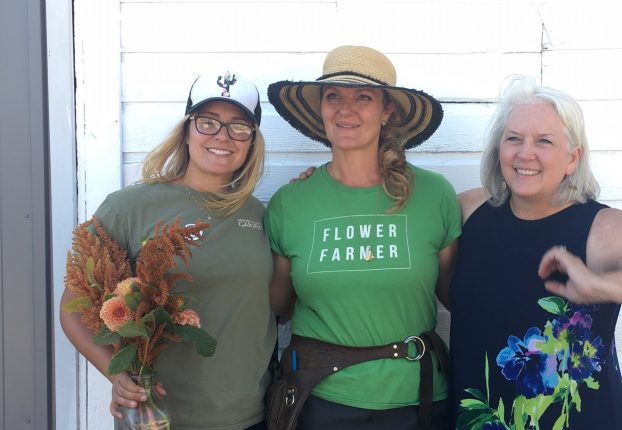
Our Slow Flowers Workshop and Tour at Red Daisy Farm capped of two wonderful days in Denver earlier this month. From left, Sarah Olson, Meg McGuire and Debra Prinzing
The following day, we had two tours on the schedule. I’ll tell you about our visit to Red Daisy Farm in Brighton, Colorado, first. Meg McGuire and Terry Bauman own Red Daisy Farm, where they grow cut beautiful flowers to sell to florists and DIY brides, operate an equally beautiful Air BnB on the farm, and open up the barn for regular sales of antiques, collectibles and Meg and her sister’s regular vintage finds.
The DBG group gathered for a farm tour with Meg, followed by a delicious lunch and a hands-on floral design workshop that I taught, using gorgeous flowers, herbs and foliage from the farm. Meg is a past guest of this podcast.
We had sold-out attendances at The Fresh Herb Co. and at Red Daisy Farm and I’m so pleased that more people in that community connected with locally-grown flowers in a significant way by meeting the people behind the flowers. That’s authentic and beats any expensive marketing campaign, folks.
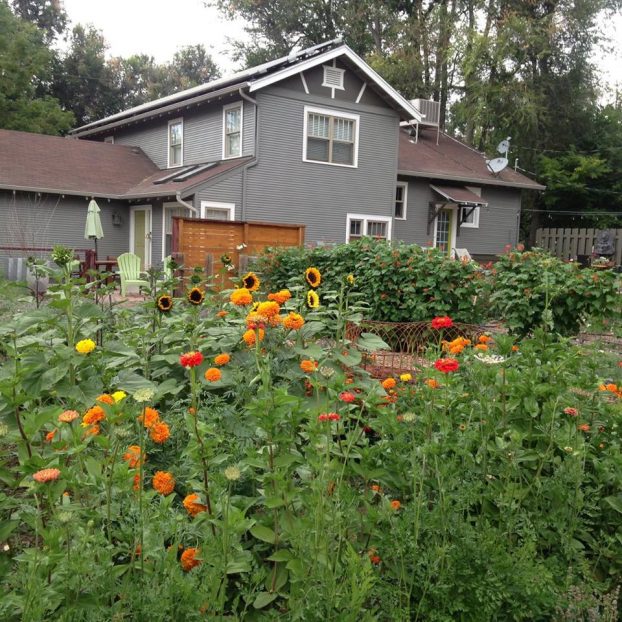
Slow Flowers Podcast visits CityGal Farms in Denver
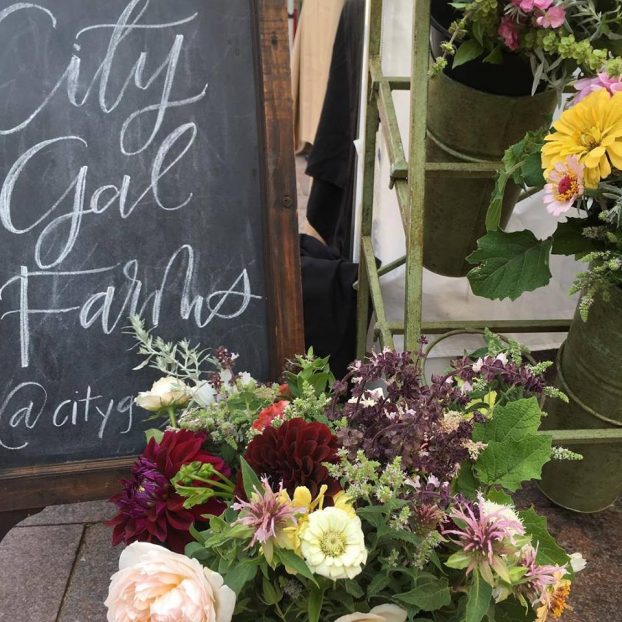 Our final tour was set for CityGal Farms, owned by Kim Burton and her husband Ken in Lakewood, Colorado, just outside Denver’s city limits. I was so excited to see Kim’s operation, because she had invited us to visit during harvest and production for CityGal’s regular bouquet-making session.
Our final tour was set for CityGal Farms, owned by Kim Burton and her husband Ken in Lakewood, Colorado, just outside Denver’s city limits. I was so excited to see Kim’s operation, because she had invited us to visit during harvest and production for CityGal’s regular bouquet-making session.
Denver Botanic Garden has been promoting this Slow Flowers programming for months, which is why we were so devastated for Kim when one week prior to the tour a summer hail storm hammered CityGal Farms.
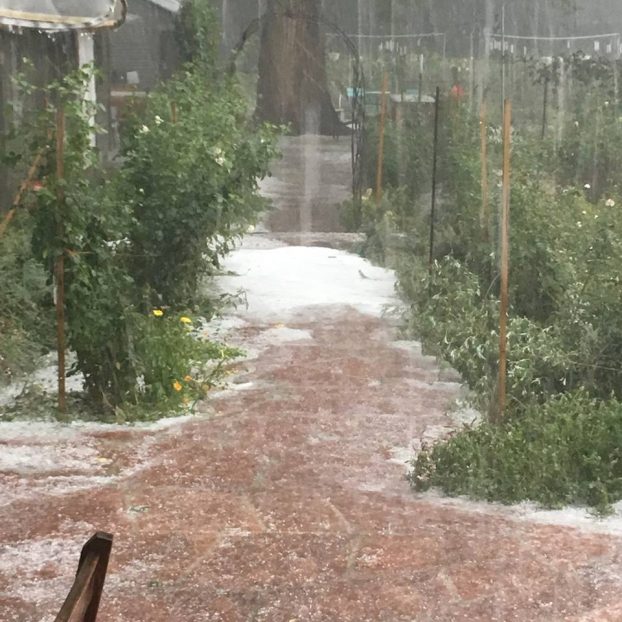
Summer hail on September 6th at CityGal Farms.
She posted photos of the hail damage on her Facebook page and wrote this:
Late Wednesday, our farm got hit with hail, rain and wind. Most of our orders had thankfully been harvested, and while not everything was destroyed, our plants took a pretty heavy beating. Thankfully we have a good team that jumped into action, and we are babying them back to health. Getting hit with hail is never good for farmers, and we join the roster of many Colorado farmers who have been affected by hail this year; getting hit in the biggest wedding month of the year and our opportunity to turn a profit is painful. Still, we love what we do, and the little bit of beauty we bring. Thanks to our amazing crew and customers who continue to support our farm. We are humbled by your dedication.
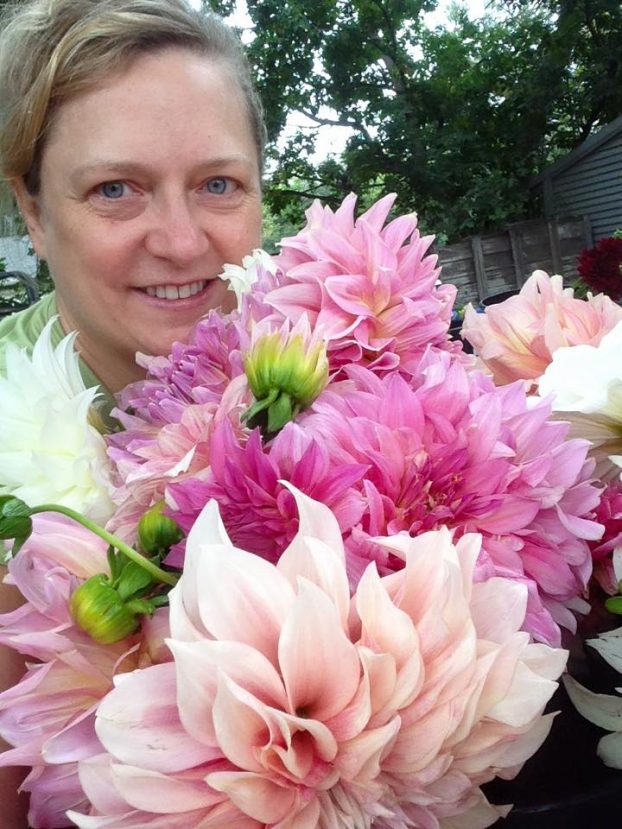
Kim Burton with her Colorado-grown dahlias.
The tour was regrettably cancelled, but the good news is that CityGal Farms is bouncing back, like so many others have done. In fact, similar wind and hailstorms have hit Red Daisy Farm twice this year — last spring and early summer, damaging their hoop houses and destroying huge swaths of flowers. And at The Fresh Herb Company a few years back, flooding and the residual mud flow from that disaster wiped out nearly a full season’s production.
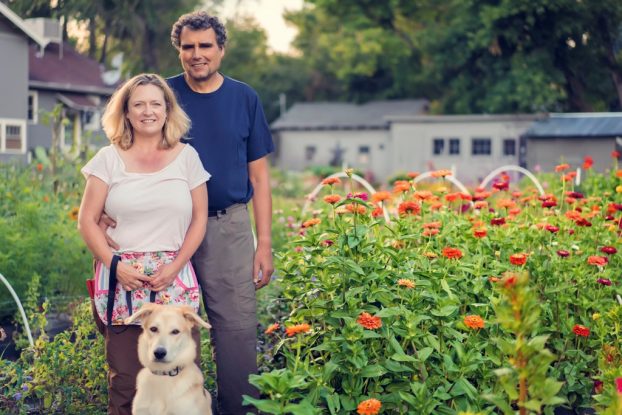
Kim and Ken Burton of CityGal Farms
There is passion and true grit behind what flower farmers do — day in and day out. And I’m so proud to be in this community where we can support one another, share ideas, dreams, resources, experiences. I am also committed to helping those in the Slow Flowers Community tell their stories.
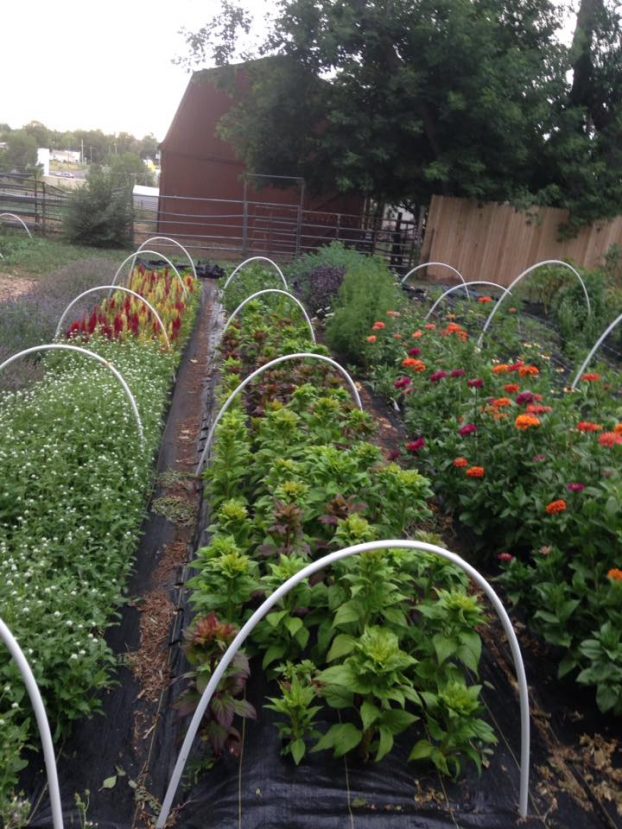
Urban farm meets local demand at CityGal Farms.
Today, that story comes from Kim Burton of CityGal Farms. She has taken a path that will resonate with many of you. One that is a deeply personal narrative that led her from a corporate background to a life connected with the land.
I love how Gina Hemmings of Mossflower, a CityGal floral design customer and Slow Flowers member, describes the farm on her web site’s “meet the grower” page. Gina writes:
Hidden in plain sight, CityGal Farms is an urban farm and farmhouse retreat (available via Airbnb) located just 5 miles west of downtown Denver. Kim grows classic and beautiful focal flowers such as dahlias, lisianthus and garden roses utilizing organic methods. She’s also growing interesting foliage and accent flowers including bells of Ireland, raspberry and blackberry vines, scented geranium, herbs and delphinium. On summer weekends, you can find Kim at the Union Station and Pearl Street Farmers Markets in Denver.
Please enjoy my conversation with Kim Burton. Here’s how you can find and follow CityGal Farms:
CityGal Farms on Facebook
CityGal Farms on Instagram
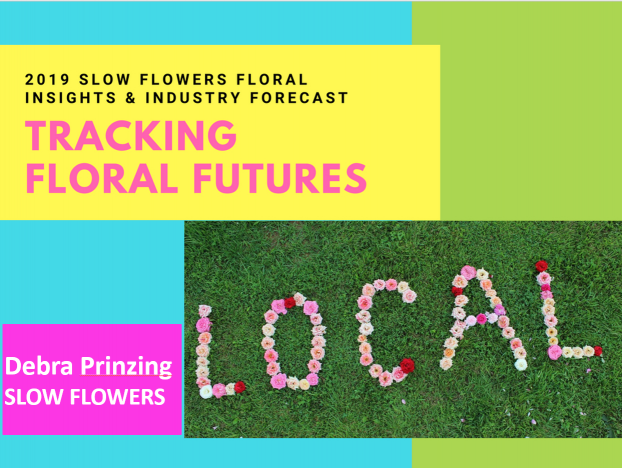
This week, I’ll be in Raleigh, N.C., with the Association of Specialty Cut Flower Growers, annual symposium — where I will be presenting a preview of the 2019 Slow Flowers Floral Insights & Industry Forecast. I’m eager to connect with so many of you! And you can be sure that I’ll have my audio recorded and microphone with me to capture more interviews to bring to listeners. Stay tuned!
 We have a vital and vibrant community of flower farmers and floral designers who together define the Slow Flowers Movement. As our cause gains more supporters and more passionate participants who believe in the importance of the American cut flower industry, the momentum is contagious.
We have a vital and vibrant community of flower farmers and floral designers who together define the Slow Flowers Movement. As our cause gains more supporters and more passionate participants who believe in the importance of the American cut flower industry, the momentum is contagious.
I know you feel it, too. I value your support and invite you to show your thanks and with a donation to support my ongoing advocacy, education and outreach activities. You can find the donate button in the column to the right.
The Slow Flowers Podcast has been downloaded more than 363,000 times by listeners like you. Thank you for listening, commenting and sharing – it means so much.
Thank you to our sponsors who have supported Slow Flowers and all our programs.

Florists’ Review magazine. I’m delighted to serve as Contributing Editor for Slow Flowers Journal, found in the pages of Florists’ Review. It’s the leading trade magazine in the floral industry and the only independent periodical for the retail, wholesale and supplier market.
Arctic Alaska Peonies, a cooperative of passionate family farms in the heart of Alaska providing bigger, better peony flowers during the months of July and August. Visit them today at arcticalaskapeonies.com
Seattle Wholesale Growers Market, a farmer-owned cooperative committed to providing the very best the Pacific Northwest has to offer in cut flowers, foliage and plants. The Growers Market’s mission is to foster a vibrant marketplace that sustains local flower farms and provides top-quality products and service to the local floral industry. Find them at seattlewholesalegrowersmarket.com
Longfield Gardens provides home gardeners with high quality flower bulbs and perennials. Their online store offers plants for every region and every season, from tulips and daffodils to dahlias, caladiums and amaryllis. Visit them at longfield-gardens.com.
Syndicate Sales, an American manufacturer of vases and accessories for the professional florist. Look for the American Flag Icon to find Syndicate’s USA-made products and join the Syndicate Stars loyalty program at syndicatesales.com.
Johnny’s Selected Seeds, an employee-owned company that provides our industry the best flower, herb and vegetable seeds — supplied to farms large and small and even backyard cutting gardens like mine. Check them out at johnnysseeds.com.
Association of Specialty Cut Flower Growers. Formed in 1988, ASCFG was created to educate, unite, and support commercial cut flower growers. It mission is to help growers produce high-quality floral material, and to foster and promote the local availability of that product. Learn more at ascfg.org
Mayesh Wholesale Florist. Family-owned since 1978, Mayesh is the premier wedding and event supplier in the U.S. and we’re thrilled to partner with Mayesh to promote local and domestic flowers, which they source from farms large and small around the U.S. Learn more at mayesh.com.
Certified American Grown Flowers. The Certified American-Grown program and label provide a guarantee for designers and consumers on the source of their flowers. Take pride in your flowers and buy with confidence, ask for Certified American Grown Flowers. To learn more visit americangrownflowers.org.
And the Team Flower Conference – a professional floral event where flower lovers from all over the world gather for networking, learning, and celebration. It’s a special time for the floral industry to come together and whether you’re a farmer, designer, wholesaler, or just love flowers, you’re invited to attend as Team Flowers dreams big for the industry’s future. Head to teamflower.org/slowflowers to learn more about the 2019 conference in Waco, Texas!
I’m Debra Prinzing, host and producer of the Slow Flowers Podcast.
Next week, you’re invited to join me in putting more American grown flowers on the table, one vase at a time. And If you like what you hear, please consider logging onto iTunes and posting a listener review.
The content and opinions expressed here are either mine alone or those of my guests alone, independent of any podcast sponsor or other person, company or organization.
The Slow Flowers Podcast is engineered and edited by Andrew Brenlan. Learn more about his work at soundbodymovement.com.
Music Credits:
Yarrow and Root
by Blue Dot Sessions
Clap Along
Posted in American Grown, Blog Posts, Creativity, floral design, Flower Farming, General, Podcast Episodes, SLOW FLOWERS Podcast, Slowflowers.com the Directory of American Flowers | No Comments »
September 19th, 2018
Podcast: Play in new window | Download
Subscribe: Apple Podcasts | Podcast Index | | More
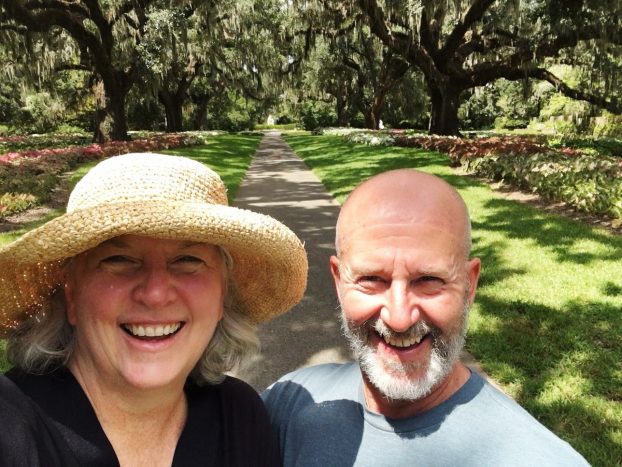
Jim Martin, today’s guest, is an amazing horticulturist and Southern flower farmer. We snapped this selfie at Brookgreen Gardens where Jim once worked.
Less than a month ago, I traveled to Charleston, S.C., where I spoke at the Southern Flower Symposium, hosted by Lowcountry Flower Growers. A number of wonderful and incredibly talented farmers and designers participated in the one-day conference, which was themed: “Future Forward Flower Success.”
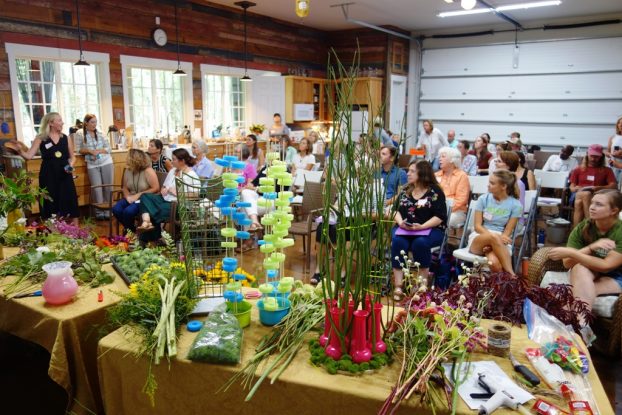
After Rita Anders and I gave the morning presentations, the afternoon sessions at Southern Flower Symposium turned to floral design. Here, Anne Graves of Syndicate Sales discusses the company’s commitment to making vases and floral accessories in the U.S. Syndicate donated vessels for the design demonstration.
It was a fabulous time and I was honored to be invited by and hosted by today’s guest, Jim Martin. As a veteran horticulturist who has had a long career in public gardens, Jim works as director of programs for the Charleston Parks Conservancy. As a flower and veggie grower, he owns Compost in my Shoe, which originated as a garden blog and is now also the name of Jim’s farming enterprise.
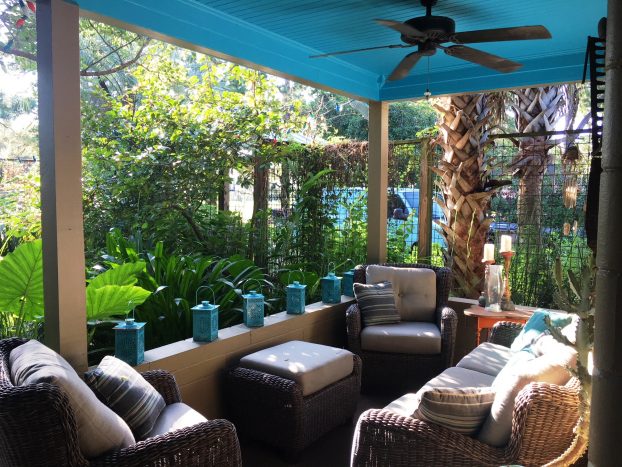
Jim and David’s Southern front porch, inviting, comfortable, private and conducive to wonderful conversations.
Jim and his partner David Vagasky live incredibly creative lives on James Island, where there are lazy fans suspended above one’s bed, where there’s a covered porch with comfy chairs where you can sit and gaze at the lush, green garden, while sipping a glass of wine; Jim and David, along with their three friendly pups, took very good care of me. David is a culinary instructor, talented chef and chocolatier, a pedigree which immediately won me over!
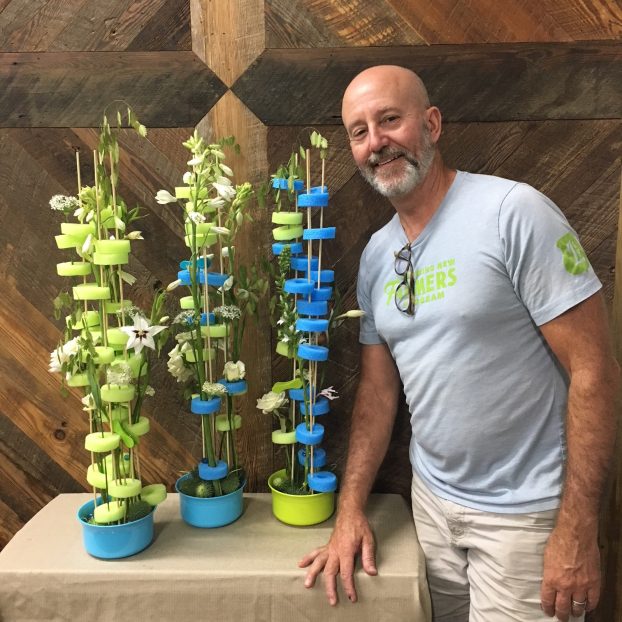
Jim Martin with one of his floral creations inspired by the theme “Structure.” He used all locally-grown flowers and created three rhythmic towers with foam disks sliced from swimming pool “noodles.”
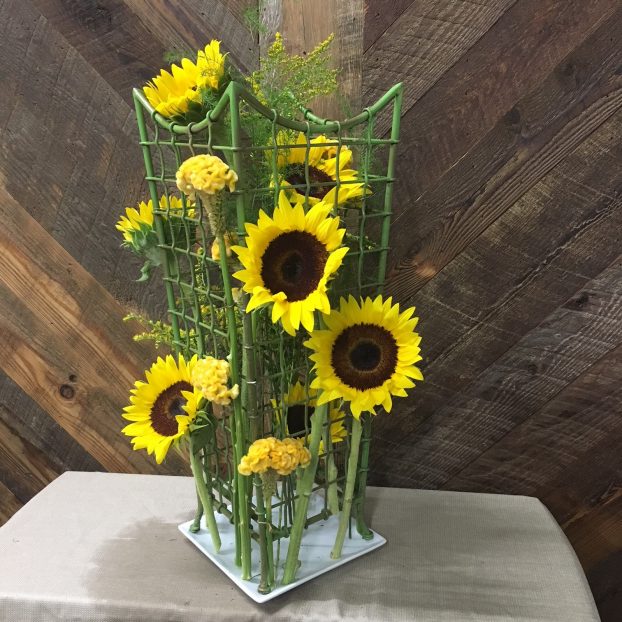
Another beautiful Jim Martin design featuring sunflowers, celosia and goldenrod stems, arranged in a metal frame that was once a wastebin.
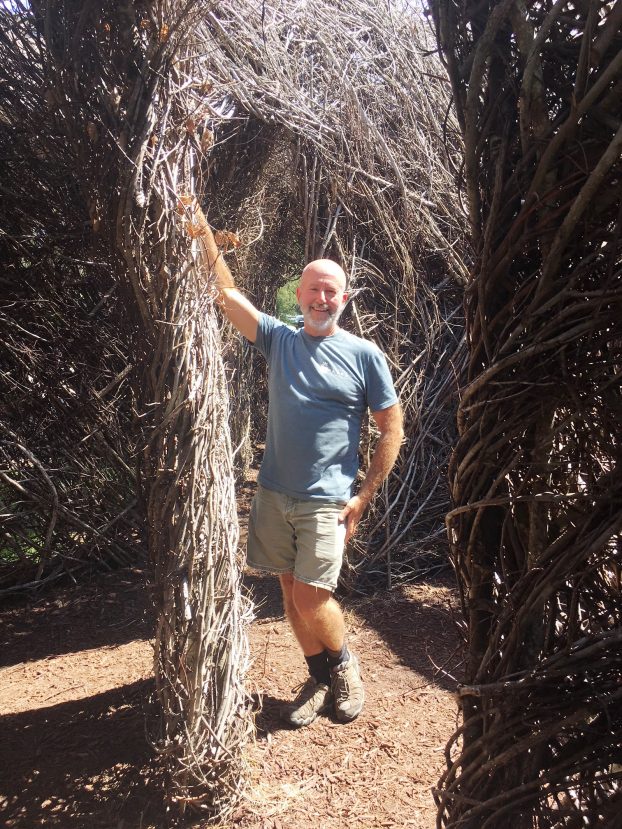
Jim took me to tour Brookgreen Gardens near Myrtle Beach, where he once worked. We stumbled across a fantastic Patrick Dougherty installation!
My friendship with Jim dates back about 10 years through the Garden Writers Association, which found us serving on a long-range strategic planning task force in 2011 – a volunteer role that cemented our affection for one another.
How wonderful for me that Jim has always been a student of floral design, having presented on the national stage at past American Institute of Floral Designers conferences.
He is currently a candidate for the European Master Certification with Hitomi Gilliam AIFD and Tomas De Bruyne. Floral design and growing flowers brought us together more frequently than our garden blogs ever did.
I am excited to share Jim’s story today during our podcast — it’s an inspiring convergence of horticulture and floriculture.
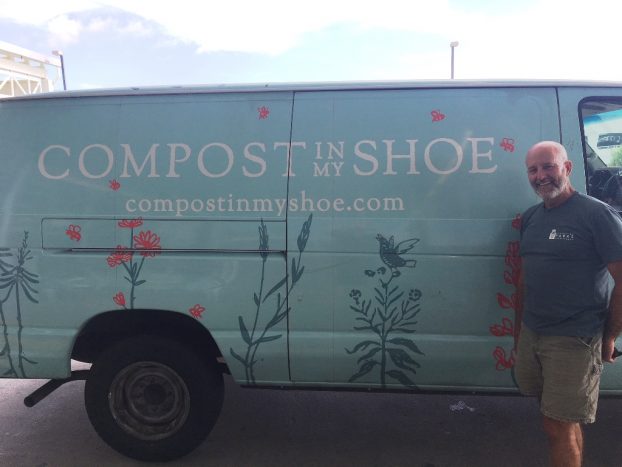
Jim Martin, Compost in my Shoe
Here’s a bit more about Jim Martin, from Compost in My Shoe’s “about” page:
Jim Martin’s relationship with the land began on a dairy farm in northern Ohio. Caring for the soil was what they called organic farming.
A move to the Palmetto State at age 13 meant learning to garden in a foreign land. His 25-year career in horticulture is coming full circle with Compost In My Shoe.
His lifelong relationship with the land is shared today through his garden design, boutique farming and teaching/consulting.
Compost in my Shoe is dedicated to growing and developing high quality produce, products and services while nurturing the life-giving bond we all have with the land.
Jim Martin is a lifelong gardener and horticulturist who has worked in public horticulture for 29 years. During his 12-year tenure as director of horticulture at the Riverbanks Zoo in Columbia, S.C., he played a key role in the development of their nationally-recognized 90-acre Botanical Garden. He also served for 5 years as the vice president of horticulture for Brookgreen Gardens, the first public sculpture garden in America, on Pawley’s Island, S.C. He has been with the Charleston Parks Conservancy since 2007 as Director of Programs.
Jim farms in the Lowcountry through Compost In My Shoe. Other interests include the floral arts, photography and gardening.
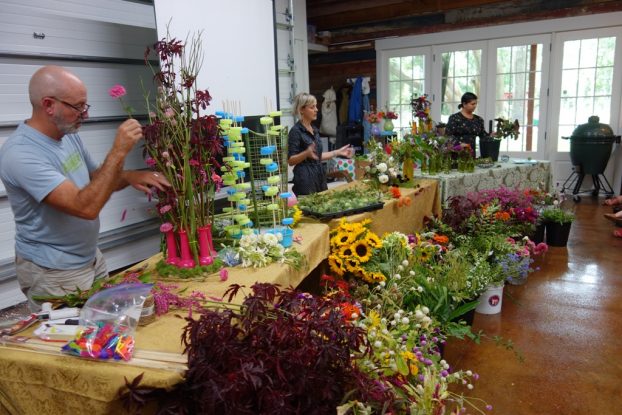
Jim Martin (left), with Ann Cunniffe of Purple Magnolia (center) and Toni Reale (right), presented the floral design portion of the Southern Flowers Symposium.
As I mentioned, Jim is one of the co-founders of the Lowcountry Flower Growers, along with Laura Mewbourn of Feast & Flora Farm and Peachey Trudell of One Wild Acre. Lowcountry Flower Growers is a registered 501(c)3 non-profit dedicated to serving the Charleston and Lowcountry flower farming community through public advocacy and private educational opportunities for southern growers.
In 2017, seven Lowcountry flower farmers met to discuss their commitment to producing beautiful, high-quality floral crops for coastal South Carolina. They knew that locally-grown produce, prized for its exceptional flavor and quality, is a vital part of the Lowcountry economy. The farmers agreed to work together to set the same high standards for the locally-grown bouquets gracing the tables of their customers.
Lowcountry Flower Growers was incorporated in 2017 and received federal tax exempt status in 2018. In that brief time, the group has hosted multiple events to raise public awareness about locally grown flowers, particularly during the 2017 and 2018 American Flowers Week campaign. And most recently, they hosted the Southern Flower Symposium.
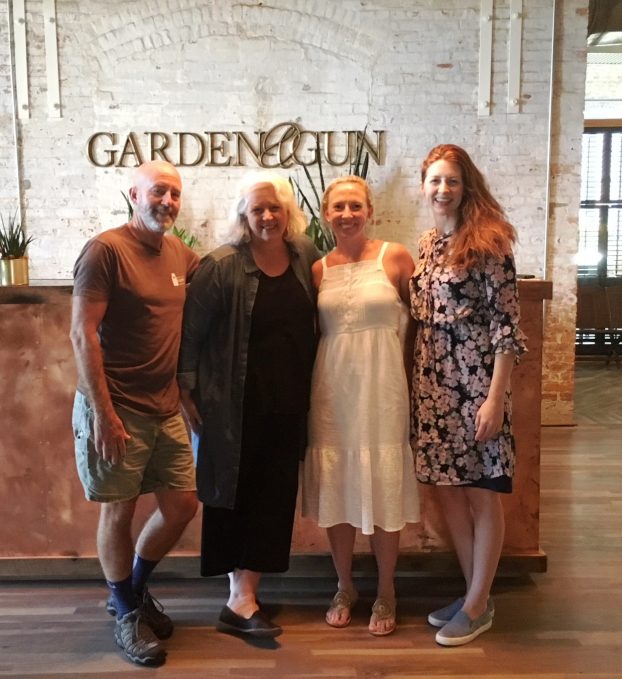
Our tour of Charleston included a visit to the editorial offices of Garden & Gun magazine, courtesy of Anne Graves. From left: Jim, Debra, Anne and one of G&G’s editors, CJ Lotz.
Before we turn to my interview with Jim, recorded on August 29th when there was no hint of a Hurricane called Florence, I want to update you on our flower farming community in Charleston. Jim and I spoke a few days ago and he reported that the area avoided the worst of the storm; Jim and David and their dogs were not required to evacuate and the hurricane was downgraded considerably last weekend.
Areas between Wilmington and Myrtle Beach were hit hardest and elsewhere, heavy, heavy rains and some flooding occurred. If you’ve heard of any flower farms sustaining damage or loss, please let me know.
Despite Compost in My Shoe’s good fortune this time around, Jim added this: “Most people are clueless about what farmers go through. Everything they’ve worked for can be gone in an instant, changed in a storm, hurricane or flood. And we just start over.”
Profound and humbling to say the least. In our interview, one of Jim’s comments really resonated with me. I think you’ll find it meaningful, given everything that’s going on in our world. He said: “It’s a global world but we have to live in it in a local way.” Profound!
Find and follow Jim Martin at these social places:
Compost in my Shoe on Facebook
Compost in my Shoe on Instagram
Thanks so much for joining me today. Climate’s impact on flower farming is seemingly worse than ever. Last weekend, I also reached out to Melissa Smith of Fraylick Farm in Travelers Rest, S.C., and a leader of the SC Upstate Flower Growers group, many of whom attended the Southern Flower Symposium. She sent this update: “So far, Florence has been a non-event here. Every time I look at the radar, my farm is just outside where the worst rain and wind is hitting in this area. Really grateful that we appear to have been spared this time!”
Next week, you’ll hear from Kim Burton of Denver’s CityGal Farms, who two weeks ago was hit with a freak hail storm, not the first of the area’s 2018 disasters.
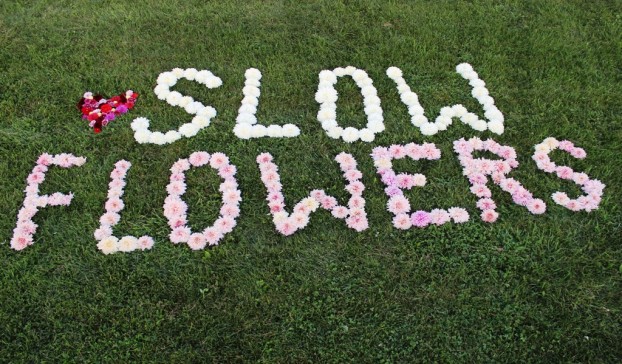
Designed by Nancy Cameron of Destiny Hill Flower Farm.
We have a vital and vibrant community of flower farmers and floral designers who together define the Slow Flowers Movement. As our cause gains more supporters and more passionate participants who believe in the importance of the American cut flower industry, the momentum is contagious.
I know you feel it, too. I value your support and invite you to show your thanks and with a donation to support my ongoing advocacy, education and outreach activities. You can find the donate button in the column to the right.
The Slow Flowers Podcast has been downloaded more than 360,000 times by listeners like you. Thank you for listening, commenting and sharing – it means so much.
 Thank you to our sponsors who have supported Slow Flowers and all our programs.
Thank you to our sponsors who have supported Slow Flowers and all our programs.
Florists’ Review magazine. I’m delighted to serve as Contributing Editor for Slow Flowers Journal, found in the pages of Florists’ Review. It’s the leading trade magazine in the floral industry and the only independent periodical for the retail, wholesale and supplier market.
Arctic Alaska Peonies, a cooperative of passionate family farms in the heart of Alaska providing bigger, better peony flowers during the months of July and August. Visit them today at arcticalaskapeonies.com
Seattle Wholesale Growers Market, a farmer-owned cooperative committed to providing the very best the Pacific Northwest has to offer in cut flowers, foliage and plants. The Growers Market’s mission is to foster a vibrant marketplace that sustains local flower farms and provides top-quality products and service to the local floral industry. Find them at seattlewholesalegrowersmarket.com
Longfield Gardens provides home gardeners with high quality flower bulbs and perennials. Their online store offers plants for every region and every season, from tulips and daffodils to dahlias, caladiums and amaryllis. Visit them at longfield-gardens.com.
Syndicate Sales, an American manufacturer of vases and accessories for the professional florist. Look for the American Flag Icon to find Syndicate’s USA-made products and join the Syndicate Stars loyalty program at syndicatesales.com.
Johnny’s Selected Seeds, an employee-owned company that provides our industry the best flower, herb and vegetable seeds — supplied to farms large and small and even backyard cutting gardens like mine. Check them out at johnnysseeds.com.
Association of Specialty Cut Flower Growers. Formed in 1988, ASCFG was created to educate, unite, and support commercial cut flower growers. It mission is to help growers produce high-quality floral material, and to foster and promote the local availability of that product. Learn more at ascfg.org
Mayesh Wholesale Florist. Family-owned since 1978, Mayesh is the premier wedding and event supplier in the U.S. and we’re thrilled to partner with Mayesh to promote local and domestic flowers, which they source from farms large and small around the U.S. Learn more at mayesh.com.
Certified American Grown Flowers. The Certified American-Grown program and label provide a guarantee for designers and consumers on the source of their flowers. Take pride in your flowers and buy with confidence, ask for Certified American Grown Flowers. To learn more visit americangrownflowers.org.
And the Team Flower Conference – a professional floral event where flower lovers from all over the world gather for networking, learning, and celebration. It’s a special time for the floral industry to come together and whether you’re a farmer, designer, wholesaler, or just love flowers, you’re invited to attend as Team Flowers dreams big for the industry’s future. Head to teamflower.org/slowflowers to learn more about the 2019 conference in Waco, Texas!
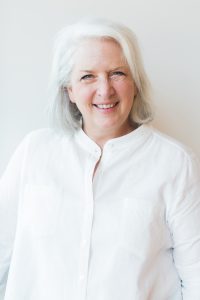
(c) Nicole Clarey Photography for Mayesh Design Star Workshop
I’m Debra Prinzing, host and producer of the Slow Flowers Podcast.
Next week, you’re invited to join me in putting more American grown flowers on the table, one vase at a time. And If you like what you hear, please consider logging onto iTunes and posting a listener review.
The content and opinions expressed here are either mine alone or those of my guests alone, independent of any podcast sponsor or other person, company or organization.
The Slow Flowers Podcast is engineered and edited by Andrew Brenlan. Learn more about his work at soundbodymovement.com.
Music Credits:
In The Field; Acoustic Meditation; Acoustic Serenity
Posted in American Grown, Blog Posts, Creativity, Entertainment, floral design, Flower Farming, Plants, Playfulness, Podcast Episodes, SLOW FLOWERS Podcast, Slowflowers.com the Directory of American Flowers | 1 Comment »
© Debra Prinzing, all written and photographic content. Website design/development by Willo Bellwood/Metric Media

 Last week, Holly Heider Chapple welcomed designers and flower lovers from near and far to Flowerstock at HOPE Flower Farm.
Last week, Holly Heider Chapple welcomed designers and flower lovers from near and far to Flowerstock at HOPE Flower Farm.




 I want to encourage you to visit the Slow Flowers Summit site to learn more about the amazing program, people and flowers you’ll engage with next summer.
I want to encourage you to visit the Slow Flowers Summit site to learn more about the amazing program, people and flowers you’ll engage with next summer. We have a vital and vibrant community of flower farmers and floral designers who together define the Slow Flowers Movement.
We have a vital and vibrant community of flower farmers and floral designers who together define the Slow Flowers Movement. The Slow Flowers Podcast has been downloaded more than 372,000 times by listeners like you. Thank you for listening, commenting and sharing – it means so much.
The Slow Flowers Podcast has been downloaded more than 372,000 times by listeners like you. Thank you for listening, commenting and sharing – it means so much.




































































